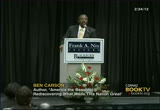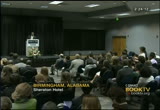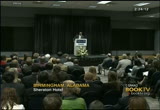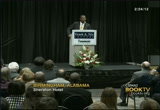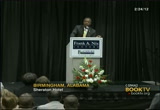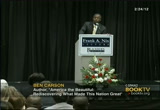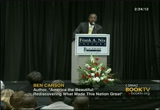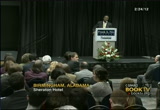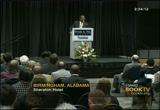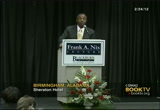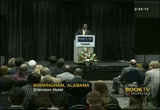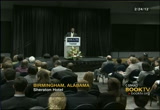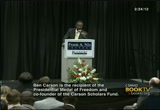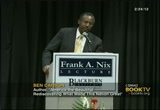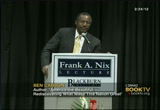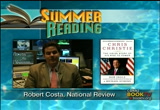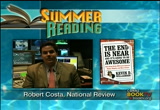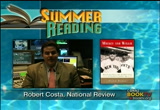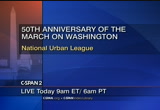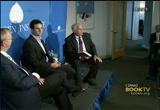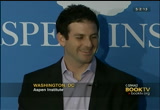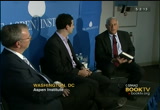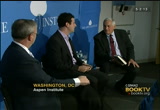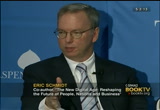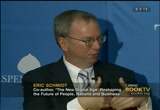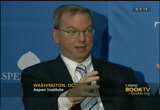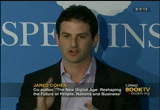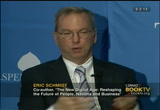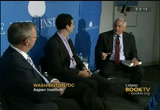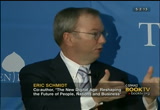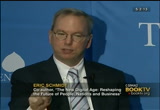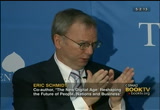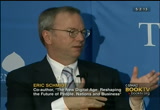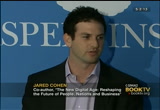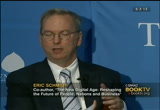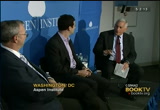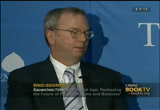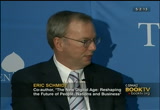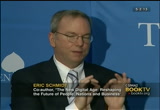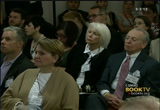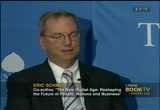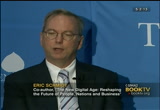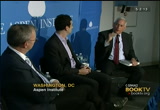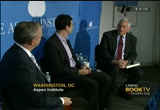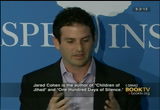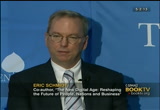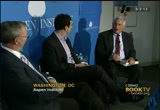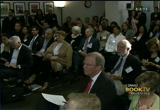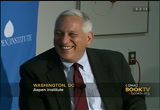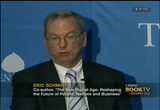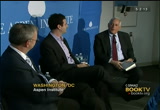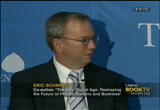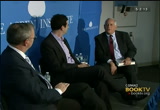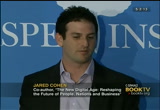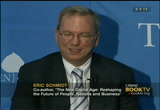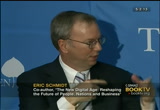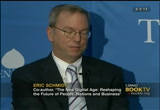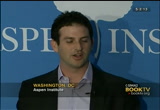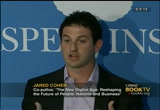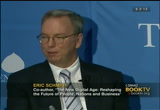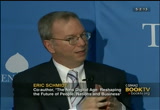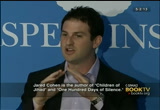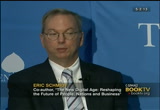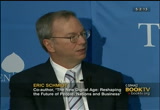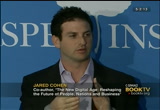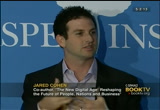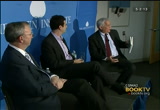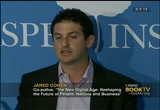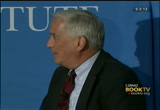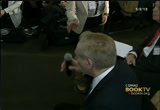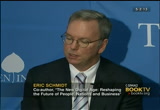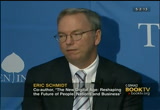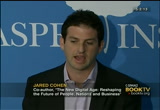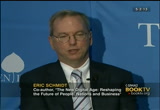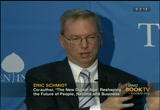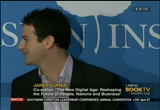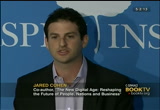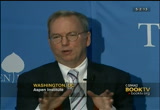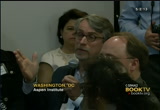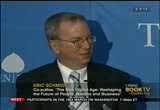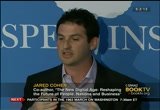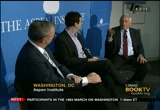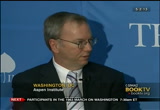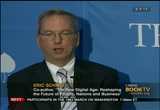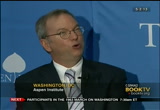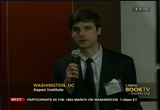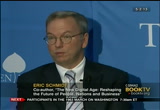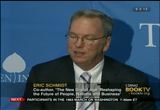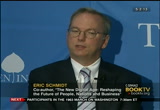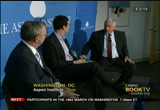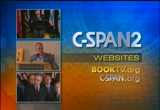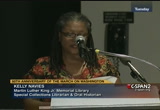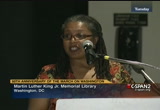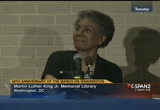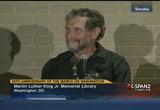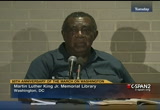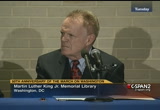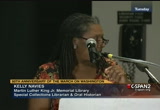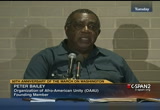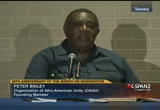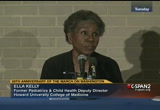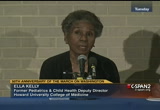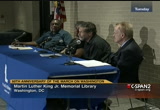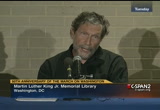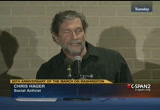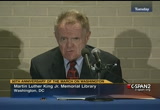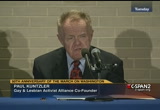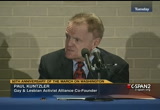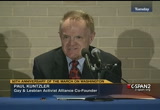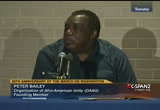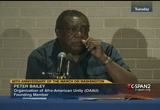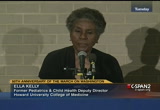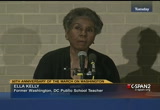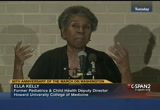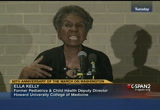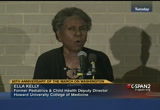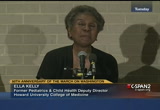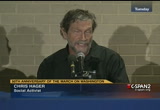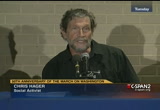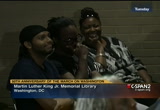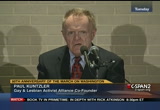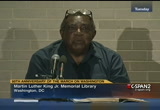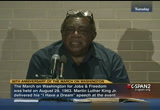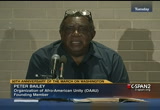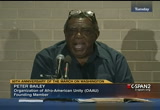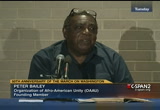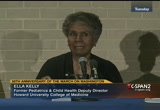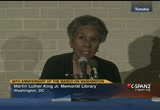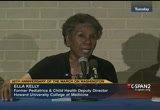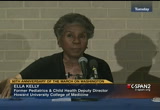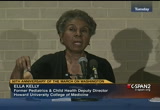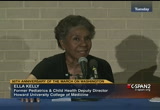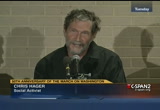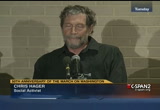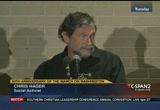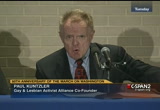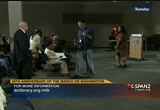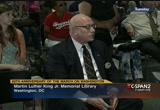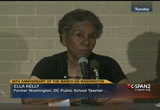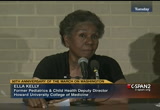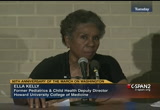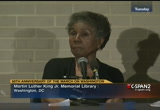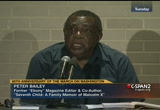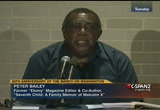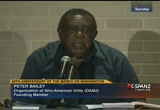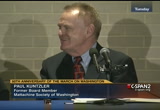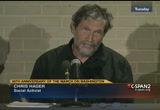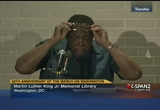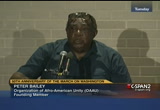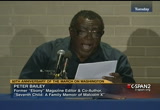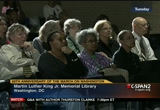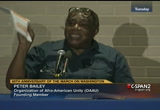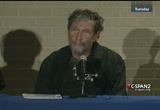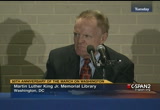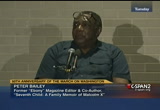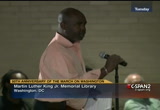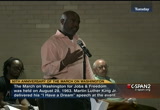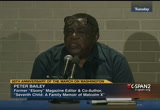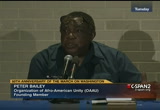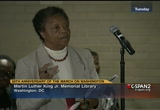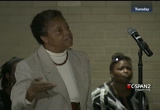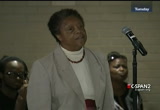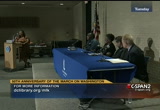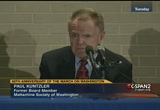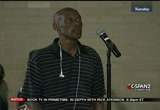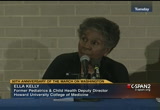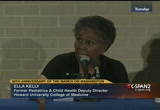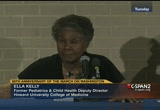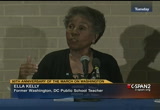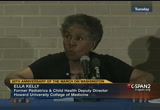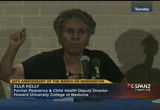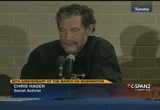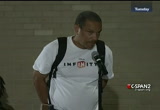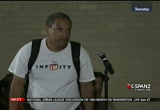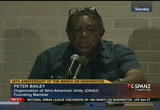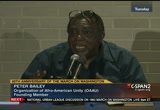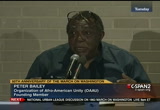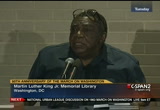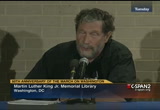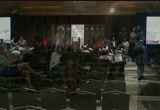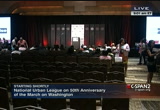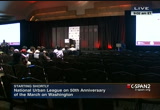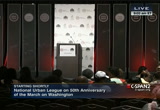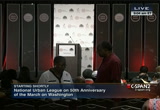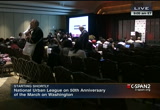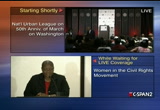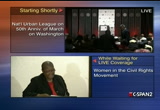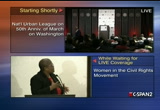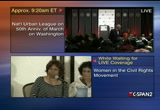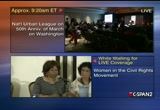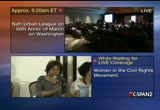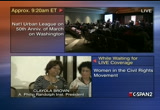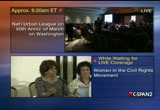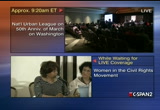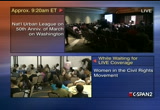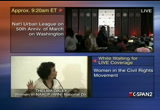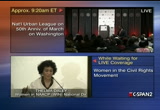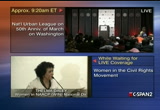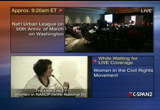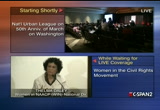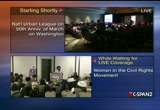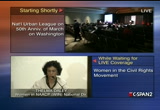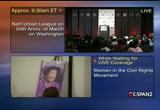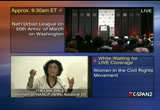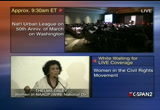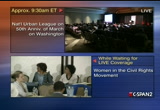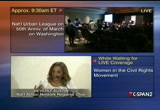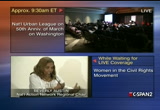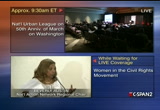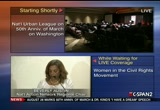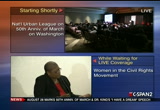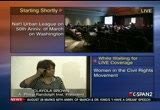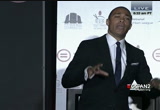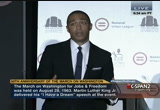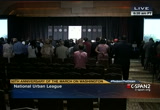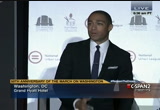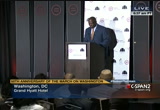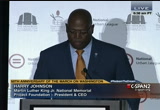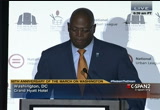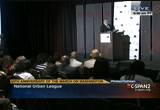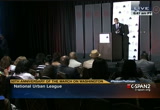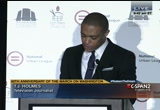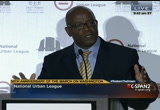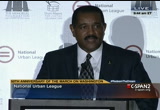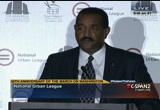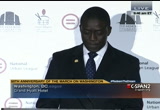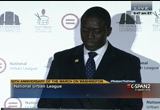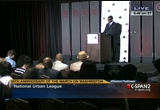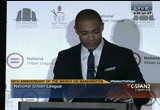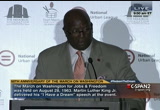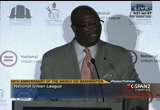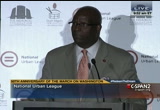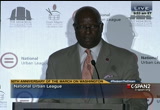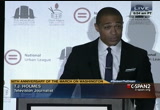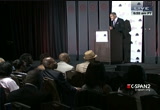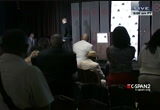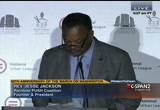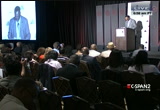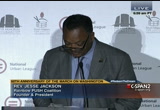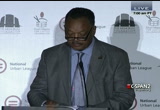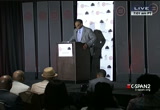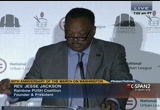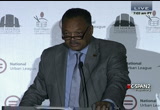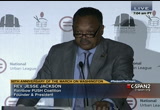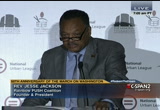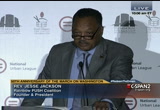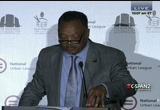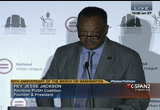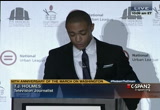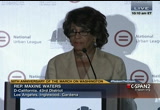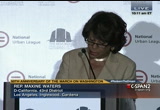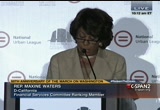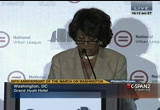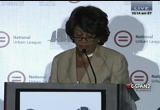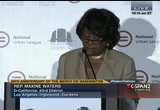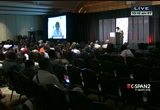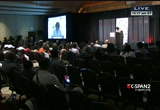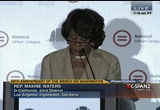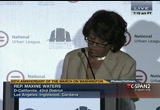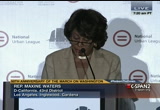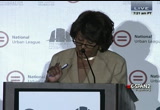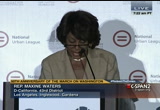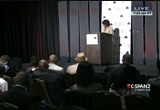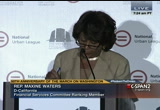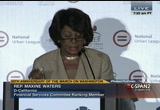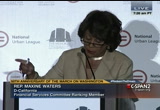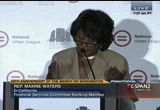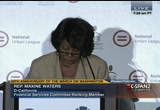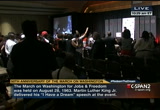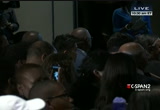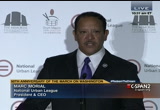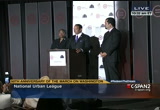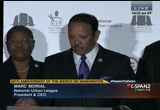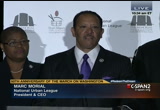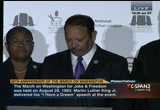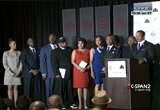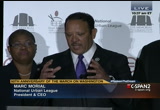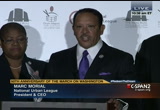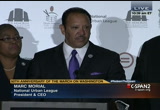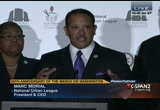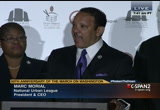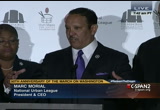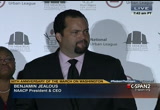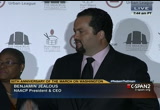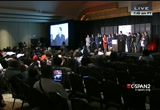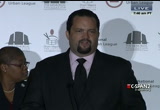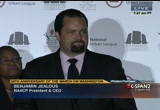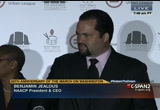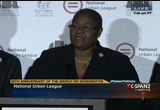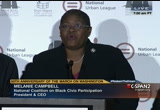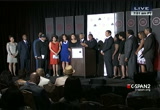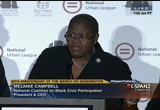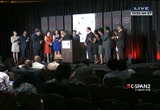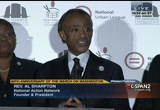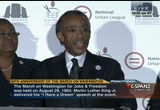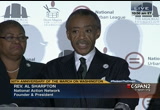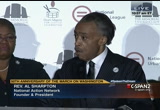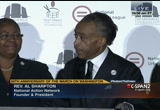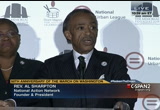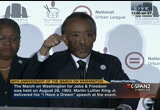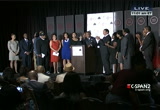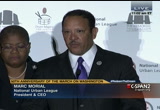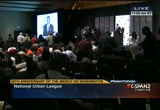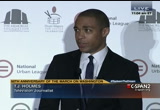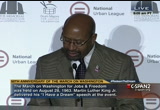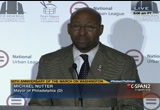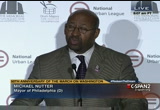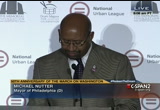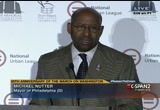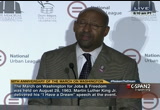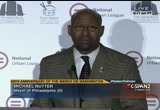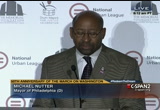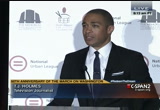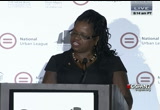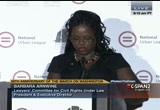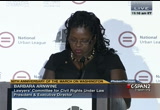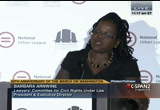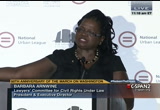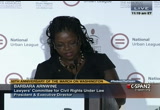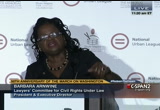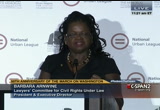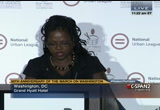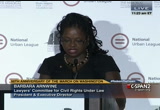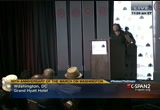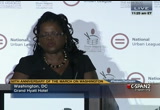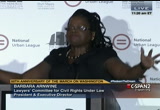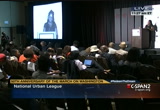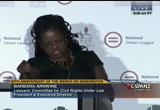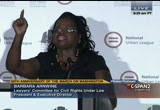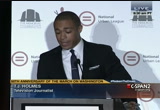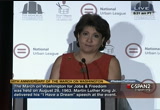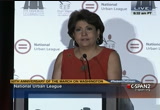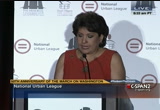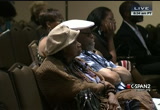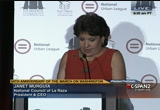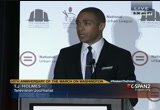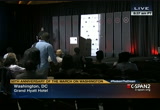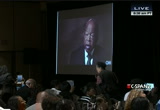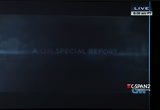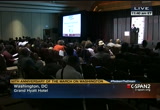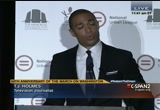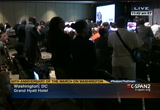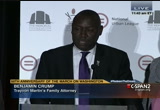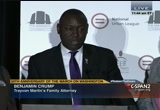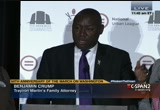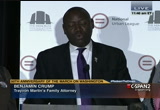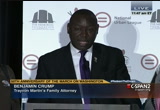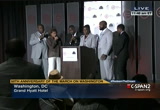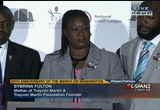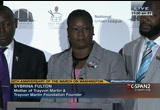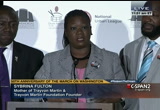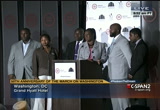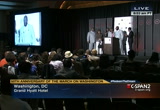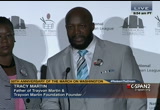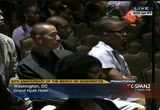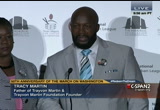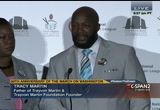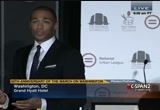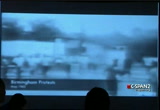tv Capitol Hill Hearings CSPAN August 23, 2013 6:00am-12:01pm EDT
6:59 am
>> it's remarkable to think about a society with no personal music, no personal sources of information, no unfiltered books, two television channels one of which plays the dear leader's speech over and over again and the other one place music. imagine, a closed society come just a few it is getting in their would significantly improve and argue the safety of the world.
7:00 am
>> and if they opened up the internet one day, along with the regime last? >> of course no one knows. the korean culture is different from other asian cultures. it's hierarchical and patriarchal, an at the childreno founded the modern north korea, put himself in charge of religion. it's possible north korea does not become a democracy on day one. it's arrogant of americans to think that some a democracy occurs in one day when it took a long time and, of course, america was formed in a unique way because everyone was a refugee from other places, except the indians. so the fact of the matter is that it's possible you could see transition not unlike what south korea went through but south korea was poor, relatively run by a strong man, relatively unfree. and over some number of decades
7:01 am
became much for your and much were democratic. >> does technology eventually make democracy inevitable? >> one of the observations that we can with actually came from me and mark. we were in the mr a little over a month ago, less than 1% as access to the unit. one of the worst decade shift in the entire world. now it's in some country and session. still very much speculative about whether its democratic transition. what was interesting about myanmar and perhaps something that shocked even us is even the less than 1% of the population has access to the internet everyone had heard of it. they understood the unit as a set of values, as a concept as an id even before they experienced it as a user or a tool. the understanding was not based on a chinese interpretation but it was not based on autocrats version. they understood in terms of its western value of the free flow of information and civil liberties. what that means to us is your
7:02 am
57% of the world's population living under some kind of an autocracy. what happens when they try to create an autocratic internet? that doesn't correspond with her democratic understanding of what it should be. what does that look like? we don't know the entity that yet. >> to finish on myanmar, burma, this would be a wonderful experiment for all of us to watch. 18 months ago, the generals either for self interested reasons are good public policy reasons, they allowed on cenci to become the future leader of the country, i'm sure she will. they have now taken a lot of press -- press restrictions on. the underlying hidden tensions in the society which they had brutally repressed for 50 years which are primarily religious in nature and are quite violent are becoming apparent. so what will happen as a society works to ease tensions, will the hard-liners come back?
7:03 am
for example, next month they will vote on sort of a press freedom law that looks an awful lot like the chinese law which is a problem. so it's not a no-brainer that these countries immediately adopt the western notions of openness, of criticism, all those kinds of things. maybe there's an alternative path. >> you say it's not inevitable that they quickly adopted. is it inevitable that they eventually a docket? >> it's inevitable that they adopt systems which work well for the middle class for the country. because the middle-class will define what it wants. they will ask for. it may not look like the kind of freedom we have, but you get a lot more free than the way these people have been operating in. >> i wish is when if you talk a little bit more about how the
7:04 am
u.s. government leverages technology to foreign policy. i just done interesting the obama campaign hired 300 dead and less, so look at who was the messenger, what platform. and yet if you look at the state department of the national security council i think there is zero or a handful of data analysts. this is a policy, this is the messenger, this is the platform we should use. so could you go beyond social media and sort of share your thoughts on how to leverage data to form foreign policy. >> the current problem is still, the good news is the foreign policy apparatus gets the importance of technology. the problem is we still view informed policy technology through the lens of public diplomacy and communicating. and i'm not -- that's just one instrument of statecraft.
7:05 am
the bigger sort of role that technology can play is and how it empowers local entities and individuals to address local challenges. there's a huge role that technology can play around correlating data. we look a lot at how to use david to map expose and disrupt illicit network from narcotraffickers do human trafficking networks, terrorist organizations. when you look at how these things are organizing government they are deeply southern. so people working on human trafficking, that typically falls in the human rights area. when people are working on narcotrafficking that sort of a dea air. so we silo these things because we look at them through the lens of their function rather than through the lens updated. all these organizations work with each other. take money laundering. if you can follow the money you can chase the money back to all these different organizations. i didn't realize that until he
7:06 am
got to google and you start talking to engineers about these problems, when engineers look at them they don't look at them through the lens of one function or another. they want to see the math. they want to see the data. they want to correlate it. engineers are tremendous silo busters. tremendous silo busters. this leads me to believe one of the biggest problems we have is how do you convince students of computer science, how do you convince electrical engineer students that if in the interest and relevant to them to serve in the public sector? i'm worried about a crisis of my generation where in some respect we are more connected, more entrepreneurial than any other generation yet we are less willing to serve in any other generation. in the public sector. we have to fix that. >> a quick word from our sponsor sponsor. [applause]
7:07 am
>> thanks. gerrit, i'd like to come back to something image before about technology making the rebellions easier to start that hard to finish. why do you think that is? is there some are, for example, ran, seemed like there was a disconnect between the power that people were getting through social media and the reality on the ground, it's of some kind of disconnect, people's hopes raised by technology meets reality on the ground? >> i think there's a couple of issues. i think technology can give people in places like iran a false sense of how things are going just because there's a crowd that is articulate and something. there's a lot of momentum and noise online. it may not translate into the streets. we may see this next month. you are starting see expectations raised online in a run about doing something so do what they did in june 2009. my guess is because they crushed
7:08 am
the green revolution so brutally and root out all that we shouldn't expect something as extraordinaire. i think the challenge is it comes down to leadership if you look at the lack bowlines a, charles de gaulle, it took decades for these guys to emerge as leaders and then eventually they became public figures. so we just reversed the model now. public figures first of may become leaders. that being said, in any of these societies if they really are true leaders who have the credibility to take the country forward, technology can find them. so when that's. so when that such of a level playing field but you can't invent them overnight. >> in the book you talk about building up the credentials eventually, a few leaders, but is different in the virtual world than it is in the physical world. >> i think we came to the conclusion, it's easy to think technology will drive all of these changes but the essence of human leadership is still very
7:09 am
hard, very important, very much dependent upon the charisma, the ability to get people excited and motivated. and those are skills which will take a long time for computers to get to. >> assuming you're right as opposed to find out and walter -- as opposed to plato and walter -- >> bad assumption. >> anonymity. what does that say about cyber crimes, since you been a victim of a, your company and so forth, do we have to complete a separate that networks that have to be secure? >> we better. i sort help the nuclear power plants and control rooms are separated on the internet. >> that's right but it's a much bigger thing to separate all the things i would like to be completely safe from potential attack, right? is that feasible?
7:10 am
>> again, let me tell you a little bit about this. the systems that do the most concerned about my safety things, command and control systems, and they're typically not connected to the internet. it is alleged a raise in the americans attack on with the iranians we processing maneuver by essentially getting a virus into the system. and get we'll see if that's true or not. it took a tremendous amount of work to do that. in the united states i can say the critical military networks are all highly separate and highly secure and it's highly illegal to move your computer from one to the other and they've done all the right things. so i don't worry as much about those as i worry about the increasing reliance of business systems that are mission-critical that are on the public internet that are subject to denial service attacks.
7:11 am
we talk about this in the book at some length, and to, the simplest thing for you all to do is to remember two things. make sure you are not using a common password across all of your accounts. and make sure the password is hard to guess. develop who is running the ap twitter account just learned that lesson to the tune of some hundreds of billions of dollars of losses from someone. and the second is don't download malware which is software you don't know, and make sure you're always running on chroma browser which is from google industry and chrome is the only browser which is not been broken. the combination of all those which is a very high degree of safety and security. if you run a company, a business, make sure you bring the most recent version of the software but almost all the attacks are ones where the attacker finds a computer sitting in a closet that people have forgot that is not been updated with the most recent
7:12 am
patches. >> will go back to you next. i think, i'll try to get around to you. spit in your world information is agnostic. the internet operates on passion and waste and yet when those ways overwhelmed science excels information is not based on fact and scientific likely see with climate change or by technology. it goes against technology and could help the world. in a world of information and agnostics how do you deal with those things? >> i think there's a couple ways that we look at this, again, the theme of the book is the next 5 billion people. i look at the alternative to the alternative is a world where every generation after the next is being essentially socialized and trained based on memorization to what they're memorizing is often factually
7:13 am
inaccurate, distorted, delusional, what other adjectives you want you to ultimately i believe in the power of critical thinking but we write about it in the book. that's when 5 billion new people connect to the internet, think about how many of those people are young and school-age, the vast majority of them. so these young people with mobile devices in the hands, and whether the teacher shows up or not, whether they're told to memorize things that night, -- or not, incredibly influenced. it's not ideal and it's not perfect and with the power power of critical thinking is important. >> and people can be frightened incorrectly and manipulated by business interests. so let's say you're busy selling something that hurts people, go back to the secret example of the 1960s. you could imagine using the profits of the corporation to try to spread falsehood. and you could make a pretty good go at it, but it would be true today that an alternative group
7:14 am
with a mass a pretty big group saying, hey, guys, this is crazy. first he was even asked choices, and second, the algorithms would eventually sort out which ones. so i think we did pretty good answer that the more information even with sponsors and we called it business this informational people are trying to manipulate you, the net sorted out, the ranking algorithms get better and my jump messages when you see something that doesn't quite make sense, check it. so for example, there's a site called snopes.com. everyday i get a message, and it doesn't quite look right and i was checked in snopes to see if it's correct or not. it is for them. we may be going through a period in society where we went from having trusted sources of information that possibly trusted source of information. one of the core conversations with have as a country, as the country, as a society, is to check. so when you watch television and
7:15 am
you're making being a little manipulate, rather than just believe it, why don't you check it? you're on a website that looks a little promotional, maybe you should check it. google is available. [laughter] >> i wonder if you could say a little bit more about the use of technology impact on organized crime. i know you've been looking into drug trafficking and i wanted to talk about concrete or more promising obligations that you have seen and the degree of cooperation with the u.s. and mexican governments. will have obama going to mexico and again this is one of the topics and i'm convinced we have not used technology to the greek we could. >> eric and i took a trip -- i'm losing track of what we went wind where. sometime last year and we were startled by the all of the police officers were wearing face mr. imagine living in this
7:16 am
city that is already very dangerous where it's so dangerous that the police were there to fully protect you don't want anyone to know their identity. what's even more extraordinary about this is while the police are hiding themselves, the population is busy using their real identities to essentially crowd source where the violence is. they're using various micro-blogging platforms and social media club forms, and so there's a virtual scourge that is emerging in places like juárez. what we find interesting and write about in the book is a challenge that it's not a unique fit to mexico but its best illustrated by mexico. when you talk about free expression, people always talk about in the context of iran, north korea, cuba. where the state is actually doing the censorship. in mexico, by all accounts the mexican government is a democracy it is a very centered society. people self censored out of fear, not of the government but
7:17 am
out of nonstate actors come in this case that there is cartels and violent criminal networks. so how do you solve the problem of removing fear through technology quick so we look at this in the book and explore various ways to encourage anonymous reporting, confidential reporting networks, and i would be sort of line if i said there's a silver bullet answer, but this is a great example of what we're saying before. engineers love these kinds of problems. >> anonymous reporting an anonymous respond. can you construct such a network so that all the players can help the situation when the police themselves are cropped? there's a technical way to do it. very hard to do. we did see some in mexico which is originally secret location in mexico city where it was sort of underground and the whole bit where they built sort of a data mining system so that when it happens somebody like on a traffic stop the consort figure out who they are. our immediate reactions were
7:18 am
those of america's come which is think about the possible civil liberties violations. the country under such terrible, terrible attack from in this case criminal gangs, might stoop to building an infrastructure which a subsequent government might didn't miss use against a law-abiding citizen. this is the trade off. it's not obvious where it will go but i will tell you the situation in mexico is very severe. >> so this question also has a mexican connection. by the way, i agree with you there is no delete button on the internet. however, covers include your own terms and conditions and unity standards. i left saw the story came out yesterday about to viral video's depicting decapitations. apparently in mexico, which went viral in my daughter's high school. the beginning of the day in facebook was standing by at its thing even though it was showing graphic violence, it was in the public interest.
7:19 am
and yet by the end of the day having online petitions and a number of us weighing in, decided to take them down. so how do you guys decide what is in the public interest or not? >> youtube has a five page document which you can read which defines precisely what this is. i have not seen that video but i would be extremely surprised that passed our test, that we would allow it. >> may be in the atlantic or something, about facebook, youtube, google, each of them having almost a committee. how does that work? >> every company has a set of rules about this. so for example, for the web google is a search engine. we don't have an ability to take these things down. and if we did it would be censorship in a form of filtering which we don't do. however, youtube will rehousing the country. we do have terms of service. this is true in blogger. i'm assuming the twitter and facebook have analogous policies but they may not have the same criteria or rules except for the
7:20 am
company. >> [inaudible] bit going for those who don't know if the virtual currency in which has been in the news a lot lately. played on bear the and the value of bit coin essential rises and falls based on demand and stockpiles large number of them. what's interesting about it though is the problem is the virtual wallet. so even if, basic people are able to get bit coin on the going got to download a digital wallet to store the a lot a number of instances where these been hacked. the canadian government actually tried to create its own national virtual currency and even they couldn't protect the virtual wallet. obviously, you're going to see more movement into both virtual currencies and virtual goods as well. but there's and series security challenges that come with it.
7:21 am
>> [inaudible] >> there's many reasons why people want to use cash, but all of the technology firms have various forms of digital wallet which are much more efficient. the phones of something called -- allows you to go to a pat neary, use white light and the charges and velocity matters for merchants so it is going to happen. >> why don't have something very simple from google like an easy pass what if i'm going around the web and i want to buy today's "new york times" or communist, something, i know a virtual wallet can get hacked but it has 25 bucks coming in, i -- >> we have -- >> it's not an easy -- >> it sounds like a simple
7:22 am
proposal, simple product to having worked on this for a long time, these are very complicated systems subject to many, many regulations. there's all sorts of fraud issues. paypal of course is a company that faces is the most and is worked through them but others have as well. and so you just defined a particular kind of wall, a wall in which are willing to use -- lose the money and. most people won't agree with you. you have to sort of figured it out. you still did not have single sign-on across all these sites. facebook and google and others are trying to promote that. so we will get there but we will do it in some different ways. >> i will survey help the chosen industry if people could make quick easy -- >> the technology around micro payments, has been around a very, very long time. so it's not a technological problem. it's sort of the system provision scale problem. >> yes, ma'am.
7:23 am
and then way back. sorry, i'm trying to be fair. >> i think we all appreciate what you did in connecting the human trafficking data because of making more efficient for access and for searching for the information but are some examples where critical information is locked up in data silos but i'm very interested in uniting our theft databases but there are too many of them and you can't search across them if you're looking for something. is google doing more in this area? i mean, what -- >> we have groups that reach out to disclose communities. it's important to know that it's their data, not ours and it's their decision to make it available. the largest trove of useful data that's not available to google is that in federal, state and local government. they have enormous databases that were built in archaic architectures, and that information should be public. it's regular to the public. it's not going to cause a huge
7:24 am
competency -- confidentiality problem to make it public. the government will run more efficiently. i think it's sort of a good thing. for the reasons that you said and so forth, we are working on it, but the core message is that if your job is to publish information and you don't publish it onto the web in such a way that search engines and google can find it, you are not really doing her job. and, indeed, we respect something called robot -which is don't call me. if you talk to one of these firms, say, okay, you've got a public sector and you're proud of yourself, do you have a robot text that prevents competitors from getting information? you may find that they have one. >> how can one get electronic medical records more easily? >> that's a whole our conversation but let me summarize by saying under the bush administration the government did a very good job of promoting interoperability
7:25 am
standards for medical records by, a technical set a sense which would allow these records to exchange with each other. that sort of a state-of-the-art. no computer scientist would ever designed the record keeping the way it is now evolving in the medical industry. it makes no sense whatsoever and that's what the difficult. it will eventually all get merged but it's very slow. >> there's a pretty brilliant report coming out today from david robinson on censorship technologies in china. >> what -- >> is called collateral freedom. they are fiercely putting up a linlink right now what you passn to the aspen. >> who isn't from? >> it's from david robinson. they surveyed 1175 censorship technology users in china, so this is a one-of-a-kind thing. they found that they're not using tools but like you said dpm.
7:26 am
they are upending the whack-a-mole model where china knows where the malls are but they are not liking them because disrupting those technology would distrust all the business users for making lots of money nearby. is that some have seen in china or other countries where the whack-a-mole and stopping right before its the mall because it's going to screw up the economy or other parts of society. >> it's a specific technologies to do in cryptic contributions. it's most notable was accusing wikileaks, although there are many places where it is used. the technology that i was referring to is the kind you describe what you essential have a proxy that you can go through. so all of the anecdotal evidence that we have is that people continue to reach services through th these whack-a-mole'sd are able to get there. gmail is blocked on the order of half the time for reasons we can never quite tell. our search efforts are blocked
7:27 am
periodically for reasons we can't quite tell. let's say, my guess would be the report is roughly accurate but we would have to take a look at it. >> could you comment on your observations about women in technology? any aspect of it, the leadership, the use of technology in developing countries? >> i would start by saying that we and i am enormously proud of the next generation of women's leadership in technology. we are seeing extraordinarily talented, very, very smart, very, very driven people driving businesses really to new heights. it's exciting but it's exciting it's occurring in an industry which historically has been so male. >> the point i would add, in the book we talk about 5 billion new people coming online. the majority of the 5 billion are women.
7:28 am
and our observation we traveled around the world, as women do better in school, women are more entrepreneurial. and a lot of these societies women have been held back and the men sit around playing video games and working for the government. you know, was finally certain to happen, it's true in some of these middle eastern countries 80% of the male population works for the public sector. so the combination of women who are already moving forward very fast in these societies were some of the new freedoms they been given plus technology will be extraordinary for the world. >> on a very serious note, the empowerment of these technologies allows the very local nature of horrific crimes against women to be recorded and policed. and there are so many examples. we visited one which i don't think we will ever forget, we visited in pakistan a group of women who have acid thrown on their faces, which is, i cannot
7:29 am
describe to you how horrific this crime is. they were using the internet to recover their identity. so on the internet no one knew they had been so victimized. building businesses, achieving the objective in a society where their shame was such that they could not go out of their homes. or can't use the internet to put pressure on the accused, who inevitably were known but not prosecuted for one of the worst crimes in humanity. so i felt that if for any reason we should do what we do, it's for that reason. >> we will and by saying education around the world will be transformed and the people who have least benefited in parts of the world from education have been girls and women, and i hope that will be a major transformation in the 21st century. this book is about to make transformation of the 21st century, "the new digital age," it hit bestseller lists. friends at politics and prose can help keep it there but if
7:30 am
you go buy the book, so go buy the book. thank you, gentlemen. [applause] >> booktv in primetime continues tonight. >> you are watching c-span2 with politics and public affairs. weekdays feature live coverage of the u.s. senate. on weeknights watch key public c policy events and every week in the latest nonfiction authors and books on booktv. you can see past programs and their schedules at our website and you can join in the conversation on social media sites. >> now, participants in the 1963
7:31 am
march on washington remember the events of that day in a discussion hosted by the martin luther king, jr. memorial library in washington, d.c. this is an hour 30 minutes. >> when our archivist suggested that i conduct oral histories with people that attended the march, i jumped at the opportunity to hear firsthand accounts of the days that i, like many of you, had only known about in books, photos and media reflections. i was curious about literal and other journeys that people took to get to the lincoln memorial on that hot august day in 1963. we put out a call for people it into the march to be interviewed and the panelists here today were the first to answer that call. it is important to note that this is the beginning of an ongoing project and derek and our collection not only oral histories but also memorabilia and other artifacts from the march to the washingtonian the community archive. two of the panelists, peter
7:32 am
bailey and doctor ella kelly were right under my nose as their regular attendees to the black studies lecture series that takes place in the black study center to announce the project they volunteered to participate. the other two, paul, contacted us eager to share their stories. i spent about an hour and a half with each of them asking them about their childhood in the united states prior to the end of legal segregation, about the major influences on the development social consciousness and about the particular reason for their being present at the march on august 28, 1963. although each came to the march from different places and have different motivations, they all share a passion for justice and equality and believe in taking action to achieve those goals. i was truly humbled to have the opportunity to sit and listen to the expenses of these for dynamic individuals and i'm
7:33 am
honored to introduce them to you today. i will begin with the only woman on the panel, doctor ella kelly. dr. kelly was born and going to south carolina in 1939 not raise in new york city. she graduated from harriet beecher stowe high school, and all gross institution but she began her undergraduate career at the state university of new york at albany but complete her degree at howard university where she was the first female elected as president of the student council. and wish you the opportunity to attend the famous debate between malcolm x and bayard rustin. she eventually went on to earn a doctorate at ucla and educational psychology with a specialization in measurement evaluation and statistics. dr. kelly speaks of a lengthy to include greek, french, spanish and mandarin. at the time of the march in washington she was a teacher in washington, d.c. public school system rather than march with a teachers union she chose to attend as brecksville the african-american red cross volunteer.
7:34 am
dr. kelly is a passionate intellectual and national teacher. i have learned so much from her in the past few months. chris hager, ceded to the left of dr. kelly, was born in washington, d.c. in 1944 where his dad had a wartime posting with the navy. his yankee parents moved his family to north carolina when you was a little boy integral primarily in asheville still in what he felt a bit like an anthropologist and a foreign land. the only yankee minister in the town that the congress shall church his family attended reacted to the events of the early civil rights era by networking with black ministers and by the late '50s they formed a mixed race youth group which he was a part of in high school. this time the lesson and working for justice and human equality repelled him to hitchhike into washington from ohio on august 27, 1963, to be here for the march on washington. the same values move him to join the peace corps and the later '60s and has informed his political activism in the decades since as he is a
7:35 am
committed in civil disobedience arrests. [laughter] he also holds a ba in a masters degree from harvard and architecture in history. i think he is the only panelist who googled and prior to our interview. he found out that i was a poet and this has been sharing his poetry with me. peter bailey on the end was born in 1938 in columbus, georgia, but raised in alabama when he expressed a tightknit black committee and good by historical black college. however, his family moved to germany when he was in high school because his father was in the military. mr. bailey also served in the military prior to attending howard university. in 1964 county became a journalist and writer. is a former associate editor of ebony magazine and the former president of the new york association of black journalists he has written three books including nmr of his close relationship with malcolm x. mr. bennet was a founding member
7:36 am
of the organization bottlenecks started before his untimely unty assassination the organization of afro-american unity. despite the skepticism towards leadership of the march on washington, mr. terry join a bus from harlem and the 10th of march because he knew it would be a historic occasion to key always brings a wealth of expense, wit and wisdom to discussions in the black study center. paul kuntzler was born in detroit, michigan, in 1941 and raised at grosse pointe there before moving to washington, d.c. in 1951, he was active with the michigan young democrats and the congress on racial he called it. he credits john f. kinney as a major influence on his political consciousness. iin december 19 city with a move to washington, d.c. just days before his 20th birthday. he attended both the northern virginia center of the university of virginia and george mason university. for 32 years he was on the senior staff of the national science speakers association as assistant executive director for
7:37 am
advertising exhibits an exhibitor workshops. in 1962, he was elected to the board of directors of the society of washington, the districts first gay-rights group. on april 17, 1965, he was one of 10 people in the world's first gay-rights picket in front of the white house. he is also one of the founders of the gay and lesbian activists alliance. he has an incredible memory are displayed by his tendency to recall events not just by the day but down to the days of the week. [laughter] so i'm going to ask each panelist to respond to three questions, about three departments of these, and then after those are answered i'll open the floor to questions. the first question, yes, we can start, okay, you're wrong. the first question for all of you to answer, why did you attend the march on washington for jobs and freedom on
7:38 am
august 20, 1963? >> okay, i've always been a history buff beginning when i was a student at howard university. and came under the influence of dr. harold lewis who in the first day of class said to us, all of their lives you have studied the history of people of european descent or in this class you study history of the rest of the people in the world. so from then on i became very serious about history. i went to the march but i was living at home at the time but i went to the march for historic reasons but i was going to be and historical event despite the fact that coming out of, 90 cq i her brother malcolm speak for the first time at 116th street and lenox avenue in harlem and he spoke for three hours. by the time his speech was over i was a malcolm eyed and i've remained one to this very day. he gave me a perception on which
7:39 am
to view the country and the world that i still use. and so i went to the march with that skepticism because brother malcolm -- people said why was he saying that? because we were reading about james baldwin of being able to speak, john lewis been told he had to change his speech. i the truth was but we heard a rumor the they told us you better get out of d.c. by sundown. we kind of went under, those of us with that kind of skepticism about the whole thing. and i think on that bus going down, my roommate and i were the only two people with that attitude. everybody else was extremely excited about. i was not disappointed in the march because to be very frank i really did not expect anything to come out.
7:40 am
>> i participated as a red cross volunteer, and you might ask why didn't i participate with all the unions and so forth and so on. well, there were several reasons. first, i got history at a junior high school in the district of columbia. i've always been a history buff, like peter. i encouraged my students always to take advantage of the history that was present here in the district of columbia. but also as a teacher i didn't make much money, and so i used to volunteer with the red cross, mainly because in those days you do not have that many organizations who provided transportation in ward seven and a for children so that they could go to athletic and other cultural events. and they need a driver, so i started in 1962 getting up one
7:41 am
saturday a week working for the red cross where i would drive a huge bus to a center over in ward seven and eight, pick up the kids, take them to baseball games, to the beach and so forth and so on. and i enjoyed it. it was something that allowed me to see other aspects of the children whom i was teaching in the classroom. and so when it was announced that the march was going to take place, they needed volunteers and i volunteered to do so. the second reason was that i grew up in new york city, and union family. my stepfather was a chef on the new york central railroad, was a member of a. philip randolph said union. and my family going back a couple generations, we were socialists, we did not vote for franklin roosevelt. we voted for henry wallace. that is, my family did.
7:42 am
so, no money but a lot of political activism. the third reason was that i went to one of these college prep high school in new york city that was single gendered. and in the days before feminism, there really were schools where young girls like me were told to go out and conquer the world, and we believed it. so it was a part of who i was by that time. it was a part of what i felt passionately about, and also felt that this is going to be one of those quote days in which if somebody says where were you on this particular day, i wanted to be a part of it. >> i guess my introduction mentioned that we had yankee family moved to north carolina when i was actually three, and i began to see things in the south from a little different viewpoint from my parents.
7:43 am
by the early '50s my parents had decided that the southern presbyterian church, and we hadn't realized that is the difference between most of the churches had -- during the pre-civil war and the first years of the civil war, and my parents felt uncomfortable there until they discovered a yankee minister african congress -- at the congregational church. by 56 or 57 he was inviting a few black people to come and sit on the aisle in the first couple of rows, and i don't think many other, serving no other national churches but very few in north carolina would've been doing that. and by the late '50s, they establish a black-white youth group which i was in. and, of course, i saw on television little rock and by the time the freedom riders were getting beaten up, it was clear that this is only going to get more difficult, more complex.
7:44 am
the spring, i guess late spring of 63 was dr. king's arrest with almost 3000 children in birmingham, and we saw that and the dogs and fire hoses on television. so it became, came to my years that in the summer of 63 there was going to be an effort called free schools in prince edward county, virginia. the segregationist county leaders had closed the schools but i think three or four years before and there have been no schooling for blacks, and, of course, they reopened private as a were schools. so i wrote to the organization and volunteered to teach that summer. i had one year in college, and i heard nothing and i went back to my family had moved to ohio, i would back to ohio for the summer, and about halfway through i got a letter from robert kennedy's justice department saying that i had
7:45 am
been examined and approved, and my assumption is that they were looking to make sure that no communist would show up in prince edward county and indoctrinate the kids. of course, by then the summer was spent and i continued, i have a job at a factory in ohio. when it was something else that wasn't as big as teaching for the summer, but something else to do, be on the right side, i stuck my thumb out on the morning of the 27th and got some good rides and got into town. [laughter] >> and i had first came to washington in january 1961 for john kennedy's inauguration. i had met john kennedy on labor day eve and worked in the kennedy campaign in michigan.
7:46 am
and i moved to washington the end of 61. it was the first, i had never experienced the degree of racism and segregation that i found in washington. as any sample, my late partner had worked for -- it's difficult, it's hard to believe there were 21, 22 white males on the staff. he was going to stem the tide institute washington to learn to become a standard type reporter. only whites could attend the institute as was the case with all of them, washington's business school. i had to go over to an employment agency which had an
7:47 am
agreement with union trust. they would send only white applicants. so i felt, you know, even though i was white but i was also gay, the discrimination and prejudice against any one group, it's against all groups. and i felt constant need for change. on wednesday morning, august 28, 1963, i left my apartment at 108, fourth street. took a bus, we had a private bus company, d.c b.c. transit -- [laughter] down from pennsylvania avenue and fourth street to the washington monument for civil rights organizations, church groups and labor unions were forming. because my father was a member of the united auto workers in detroit, he worked for chrysler
7:48 am
corporation, i marched with the uaw down constitution avenue to the lincoln memorial. and that afternoon i was on the left hand side of the reflecting pool, halfway down, and you saw on the film the temporary world war ii building, where there were soldiers. because there was a fear there was going to be riots, president kennedy had declared the virtual state of martial law, and my office was closed at 1520, 18th street. i had come, went to every civil rights marches or pick it that i knew about. so this is part of what i did. thank you. >> thank you. so the second question basically, what was the most memorable aspect of the day?
7:49 am
do you have a favorite speech and/or performance? >> i think the most memorable, to me, it just seemed the crowd. though i went down with great skepticism about anything positive happening, the fact of seeing so many people there really impressed me. and i had an opportunity to meet, including, i don't know how i met, i grew up in tuskegee, two airmen from tuskegee, but almost 280,000 people, i don't know, somehow we ended up finding each other in that crowd. i didn't get too close and i didn't really try to get very close to i was like above reflection pool, that area right above the reflection pool. so to me it was just, it was the crowd but it was seen the largeness of the crowd. and i personally, i pay very little attention to the speeches
7:50 am
but as i look back later, i think the speaker is that day made the same mistake that was made 32 years later at the million man march where speakers get up there and give inspirational speeches to people who are already inspired otherwise they would not have been the ifalpa speakership in very, very, when you go back on, do this. when you go back home, do that. here's how this can be done. it's just been really concrete come when you that many people, get to take it in to give them very concrete things to do. how to organize different things. all kinds of things like that. the speeches were, you know, the type of inspirational speeches you hear al all the time. so i just basically ignored them. i will say very quickly that one thing i noticed about dr. king's speech is that he, he was a series that day. he didn't crack one smile but if you notice throughout that entire speech he didn't crack a smile but he was very serious,
7:51 am
and i began to kind of change my mind, like i said, being and malcolm mike, not very attracted to dr. king, and what he was doing. but as i said as i began to look at that speech, i begin to change my attitude somewhat about dr. king until today, i have become, you know, i just wish that j. edgar hoover biggest nightmare had happened, that was a collision between dr. king and brother malcolm. >> it's always difficult to come behind peter, and i -- but a couple of things for me. first, i was busy taking care people who are falling out from the heat. it was hot, and it was humid.
7:52 am
and i was at a station where there was someone from the national guard. there was a d.c. policeman. in those days it was d.c. general hospital but there was an ambulance crew. we have cops, we had ice and water, and people were falling out like flies but i showed up. i think would set up by 9:00 in the morning so i was literally on my feet from 9:00 in the morning until about five in the afternoon. and it was nonstop with people falling out. the second thing, and here i probably have a different perspective, is that i had lived outside of the united states before this. i was one of those people, poor girl with a lot of dreams, but i was lucky. i got a scholarship and i lived in europe, where interestingly enough, i figure any place i wanted to go to problem that i had when i was traveling was
7:53 am
there were what i called aging imperialists who wanted to know what part of their respective empire i was from. in other words, if i was in france they wanted to know whether i was from martinique. if i was in the uk they wanted to know if i was from jamaica or someplace like that. of course, being a typical american i resented it, but, but what i did have, and here i'm, i think it was auspicious for me, i had the opportunity when i was very young, and i was 20, studying outside of the united states, i could go anywhere i wanted to go. and so the remarkable sense of freedom that you have when you don't have all the racial baggage attached to you, i have experienced that. and it made me, i became depressed. i was literally, i had been
7:54 am
chaotically most of my life and i realize it because having had that experience, every time i hear the star-spangled banner, i put my hand over my heart as we did in elementary school in new york city, but i cry because i've had the experience, even fofor a while, and later on in y life when i lived in other parts of the world, of not having the racial baggage. and being able to go any place i wanted to go as long as i could afford to do so. and to realize that people who look like me, whom i love, i could not, i could tell them of the experience but some things have to be lived. and so, the fact that they had not lived that experience has deeply troubled me all of my life. i carry that with me. and so, for me that day, was one
7:55 am
in which i had to be there, but at the same time i was not concerned about the speeches. i was angry that the press thought that people who look like me could not come, could come to washington and we would riot. i figured they knew nothing about black people. they did not know that the people who were coming, church people, people who have jobs, people who had family, people who taught in colleges and universities, those are the people who riot. and i was incensed that the press, from the very beginning, thought that these people are going to come from all over the united states to riot. well, hell, if we were going to ride we would do it where we live. we were going to come a thousand miles to do it.
7:56 am
so, one, i was too busy to the speeches. i was on constitution avenue near the washington memorial and could hear the loud speakers, but i was too busy taking care of people who were falling out from the heat. but the other thing was, when people started to arrive, it was the dignity of the people. this is a different time where we all wore jeans. but in those days, the men wore suits with hats. the women had on their best clothes or cow in the world one walked down constitution avenue in high heels on a hot august day with the humidity, i do not know, but that's what it was. i don't think we've seen since that time a group of people,
7:57 am
other than maybe the obama first inauguration, i don't think we've seen the caliber of people from across the united states marching down the main avenue in the nation's capital in that fashion. and we may not see it again. so for me it was something really, really memorable. >> you remind me, i guess i had on my hitchhiking uniform, which is in the early 1960s, meant a sport coat and tie. i had crashed with a relative of a friend, and got into town i guess about, i don't members specifically from alexandria over to where i could get up to the hill where the monument was, and i was there early enough that much of the hill was still not covered with people. they were grouped around and monument itself, and on the side
7:58 am
toward pennsylvania. sorry, well, yeah, constitution, was a stage still being set up or later, you know, josh white and so on would perform. but there was nothing, and i don't think it was no 9:00 and people started singing freedom songs. so quite a while had gone by with freedom songs, and i at least had heard most of them. i can mention also that that was the first time in my life i'd been in a majority black crowd, although, you know, it seemed like a regional thing to have at this march. so a hymn came up, or a song, freedom song came up that was based on the old hymn amen, amen. do you guys know that one lacks so it was changed, however, to freedom, freedom. juniper hearing it?
7:59 am
freedom, freedom, freedom. and it was stretched out where the long, longer than i did it. and then someone would shout out from somewhere in the crowd, freedom in the classroom, freedom on the bus, freedom at lunch counter, whatever it was. this went on, and that took about two seconds to come out and then we spent a long time on freedom. so after a while i was beginning to feel like this was getting to be a little much. some white guy not too far from me shouted out at the break, can't we have something else? [laughter] immediately at like men not far away said, mr., if we got freedom, we don't need anything else. [laughter] and that was the high point of the day for me. looking back, there's nothing that struck me as much as bat. i stayed around, i was lucky i was up forward of the reflecting pool after the first set of steps so i was moderately close,
8:00 am
8:01 am
>> when we all joined hands and swayed singing -- ♪ we shall overcome it was just a great day to be alive, and i was so impressed with everything i experienced that day. >> thank you. i want to ask one more question, and then i'm going to open it to the audience. i may have more questions later, but just, can you tell me what lessons did you take from your attendance at the march? mr. bailey? >> it's difficult for me to say because going there with the attitude that i went with, i did not feel as though i could learn very much there what happened. i think i learned, as i said
8:02 am
before, that i think that the speakers basically blew an opportunity to really provide people with some very concrete things to do. and it really, of course, now this is like hindsight. this was not the way i thought at the time. i just thought that all of this was not going to be, you know, impress anyone, the congress, the president. i didn't think any major changes were going to happen because of the march. but in hindsight, you know, as i look back now i see -- and when i really look at dr. king's speech, watching it again just now and i see that i believe that reducing dr. king's speech
8:03 am
to "i have a dream," to me, is almost criminal when you hear what he said that day. i mean, that we will never be satisfied section, the now is the time section. i mean, let freedom ring section. why weren't these given to, you know, to the young people? the whole concept of coming, we came here today the constitutional people had written a promissory note, and we came here today to catch that check. that should be what everybody is taught about that day. we've done things and sent out, tried to cash the check, and it came back marked insufficient funds. e mean, that got the biggest applause of the whole, of the speeches from just watching it. so i think that, i think reverend jeremiah wright, and i know that's almost a curse word to some people -- [laughter] i heard reverend jeremiah wright speak on january 2012
8:04 am
celebration of dr. king's birthday, and he said that, first of all, he said remember that this was a march for jobs and freedom. it was not a revival meeting as it is generally portrayed today. it was not a "kumbaya" moment. it was a mark against economic injustice. that's what it was all about. and he said it really -- sometimes i don't know which is worse; to see a, to see a people seduced by a sound bite or to see a ministry reduced to a sound bite. and, of course, he was talking about the absolute ridiculous stress on "i have a dream." i, personally, when i go be to any martin luther king dream that has the word dream in it -- [laughter] i mean, that's how really hostile i feel towards this
8:05 am
reduction of him to this "i have a dream." you know, in a speech that had some powerful statements in it. so i learned to have more respect for dr. king. and i also learned that -- can i saw once again, i have confirmed that the greatest practitioners of the english language other than -- tied with the great shakespearean actors are black baptist teachers. nobody can use the english language the way they do -- [laughter] other than the great shakespearean actors. when you hear dr. king, even if you don't like him, when he gets into that roll, boy, it is powerful. and because they have baptist preach pers all over the country
8:06 am
that speak like that. brother malcolm can speak like that. people forget his father was a baptist teacher. so that's what i learned. i learned to have a greater appreciation of dr. king. not as hutch as i should have, but i did come away with a greater appreciation. >> like many people, there was no immediate impact for me, but shortly thereafter, two or three years later, i was outside the country again, and there were some things that i was able to see from afar. i'm one of those people it takes me a long time to figure out what's going on, but when i get it, i really get it. the first was that the march on washington, that whole civil rights movement, had a global
8:07 am
impact. i lived in asia for a while, and everywhere i went people wanted to talk about civil rights in the united states. as a matter of fact, for me it got to be hackny, because i wanted to do something else. but this was, this caught global attention, and it has continued to have global attention because i don't know if you pay any attention to it, but i watch per national television -- international television, and wherever there is injustice anywhere in the world, people sing "we shall overcome." it's kind of strange to hear poland during the solidarity movement singing "we shall overcome," but this literally has become the anthem for people all over the world wherever injustice takes place. and in that regard, i think what that means is that in a certain way african-americans' lives have become essentially the
8:08 am
script on which all other scripts in terms of the fights against injustice gets writ large. ask be that say -- and that says something very powerful about african-americans in the united states. and oftentimes i think that is forgotten. i did not realize that until sometime later on. the other thing that i began to realize was the degree to which politics in this country had not paid attention to wealth and power. and increasingly i had been focused on the issue of wealth and power not only in the united states, but wealth and power as a global phenomenon. and that if if we talk about the 1% in the united states, the reality is there is now a 1% globally in which whatever happens in the world -- jobs, the lives of people -- are moved
8:09 am
around like pieces of a chessboard. and the rest of us are left in fear struggling, trying to figure out what is happening to our lives while other people whom we do not know, will never know, will never see are controlling not only our lives, but our politics. and the fact that we have yet to have in this country anybody anywhere whether it is the press, whether it's the respected political parties to talk about this global manipulation of everybody is something that i found, i find astounding. it's not in the newspapers. i've been reading "the new york times" since i was 5. it's not in "the new york times." it may be oftentimes on al-jazeera modified according to
8:10 am
whatever is their point of view or on china television modified according to their point of view or falls on -- [inaudible] modified. but no one is talking about this. and coming from new york, the ting that i remembered when i finally got a sense of what was going on was that new york city used to make the clothing for the world. especially the united states. my here was a seamstress, in the ilgwu. my father was with a. phillip randolph -- and the ilgwu was one of the major unions that made a difference in the lives of people in new york city. if you were a young guy, white, ethnic, black, you could graduate from high school, go down to 34th street, you could get a job. if you could get a job, you could ask a girl to marry you
8:11 am
because women aren't going to marry you unless you've got a job. [laughter] and once you got a job and got married, you could start a family. you can't -- young men of whatever color, if you are working class out of high school, you can't get that first job. to get a toe hold into the economy. to get your life started so you can raise your kids the way you want to, so somebody else doesn't have to tell you how to run your life. it took me a long time to really see the global impact of that and the irony is that the gat treaties, the general agreement on tariffs and trade, had just been signed a year before the march on washington. it's ironic, it's cruel, but we're seeing, we're seeing a lot of things that literally were
8:12 am
happening in the early '60s, and we're seeing the logical and economic outcome and consequences of that right now. [applause] >> i have a couple little incidents that happened in the next few days. i got a ride with a friend on down to florida where i happened at, oh, four or five in the morning to get picked up hitchhiking by two guys in a pickup truck, a double cab, i guess with. and i sat behind, and i listened to them quietly are, and they were talking about them niggers up in washington. [laughter] andi, of course, kept my little mouth shut. and about three or four days later, i was heading back toward my family in ohio, and in south carolina i had been hanging out
8:13 am
at a dusty corner. there wasn't as many interstates in those days. and finally, a car pulled up, and it was two black women with a kid, and they were all in the front seat. and i got in the backseat, and i thought, well, i'm going to tell them, and internship just so tickled -- they were just so it can led to have direct contact in any way. they out in the boonnies of south carolina had their ear cocked to what had just happened in washington. i became gradually more active, peace corps as mentioned. by the time i got back, i pretty well decided that being activist was a major part of my high. i eventually went back and got a history degree in modern american history, and i've recently genre read martin luther king's speech at the riverside church in '67, i guess it was. about a year before, to the day,
8:14 am
a year before he died. and his extraordinary perception of what the militarist america was. not just in vietnam, but be he mentioned a half a dozen other countries and said there would be more, and there have been more. and i think anyone who wants to know the real dr. king, that's a beautiful introduction. but it's only the introduction. and the real meat of dr. king comes out in that speech at riverside church beyond vietnam. and i urge everyone to read that. it's just as pertinent today as it was in 1967. and, oh, so, of course, he did mention the lonely island of poverty, but that was all he said about it and the degree to which we are becoming more and more unequal in our income and in our accumulated wealth and in our social mobility and so on. it's shocking what has happened
8:15 am
in the last 30-40 years, and dr. king would not have let any opportunity go by anywhere along that 40 years without mobilizing. and somehow we have not been mobilized, and i was hoping that when the occupy movement started a couple of years ago. but next time the economy tips over into another, and i think deeper trough is coming, i think finally people will get out and make sure the government hears what people these. need. [applause] >> as we saw earlier by the film, all three television networks televised it live from the steps of the lincoln memorial so that people all over the country viewed the march. and then when i got home, it was off -- they did it all over again. people came from all over the country from communities, and
8:16 am
they went back to those communities with an unspired message -- inspired message which helped to bring about change. president kennedy, after the march, welcomed the march leaders to the white house late that afternoon, and he greeted them with saying i have a dream. [laughter] >> thank you. so at this time we're going to open the floor to questions. we have a microphone, so if you wait a second, i'll move it to the center of the floor here. so if you could form a line in the center aisle. [inaudible conversations]- ha at
8:17 am
gun violation, and we don't have a -- you said we were going to have a discussion about race, i forget people's names, but in terms of what you were saying about not having discussions about things you said we were going -- we say we're going to have discussions about race, but we don't have discussions about race. so i want to hear what you suggest we do in order to have the discussions we should really be having instead of talking about the discussions we should really be having. >> okay. how do we have a discussion about race. well, in the united states it's going, it's virtually impossible unless you do it in small groups. you cannot have a discussion about something that you feel very strongly about if you don't
8:18 am
know the other person. and one of the things that i found interesting in my life has been the following, that i have lived virtually in two worlds. it takes a long time before people really get around to asking you the questions today really want to ask. and be so with my white friends, it's usually, well, this is how the conversation goes. first i'm asked to become with part of a group, and i always say be careful what you ask for, because be you ask my opinion, you're going to get it. so they have to get used to that. the fact that i am going to literally tell them what i think. and if you're around women, the first thing is always about men. so the white women talk about the black guys who make a pass at them, and then i talk about the white guys who come to black communities on the weekend to be with black women. and then they turn beet red, and
8:19 am
they get upset, and we talk about that, and we finally -- then it turns out that we end up talking about men being no good. so -- [laughter] so how do you have it? i don't think there's a one size fits all. i think it has to start with individual relationships, and i think it has to start with people being honest. and by the way, if we're going to talk about race, it's not just about whites and blacks and latinos. it also has to do within communities. because in my instance what i had to deal with was color. my mother is very fair, my father is very dark, and i had to grow up and listen to the conversations within race about color and within race about
8:20 am
race. so this is something that is very complex, it is very painful, and it means dealing with some things that a lot of us don't want to deal with such as who were our ancestors. the white ones and the black ones. and then everybody claims to be part indian. we must have had more indians in north america than the world allows. [laughter] but everyone claims that they've got indian ancestry. all right, so we'll give you one-sixteenth the american indian or whatever, and then weo go through the rest. but the reality is these are conversations that people do not want to have because with, ultimately, they come down to very by mate behavior. -- intimate behavior. no one wants to talk about sex and what happens with sex nobody wants to talk about lust, thoab wants to talk about desire. we'll see the movies, but we
8:21 am
don't want to talk about it. and if we cannot have those basic conversations about the most basic part of who we are as people, how can we talk about these other issues? so for me over my lifetime, i have developed long-lasting friendships with a whole bunch of people. and they have dealt with my flaws, mercifully, i've dealt with theirs, but we have talked honestly. we have gotten to a stage where we could talk honestly about things we really wanted to know. that's the only suggestion i have. >> i would just say very quickly that we cannot -- i think that we cannot have a serious discussion about race until the black community in this country country -- we are involved in
8:22 am
psychological warfare, and we do not realize that. people ask me what was it that attracted me to brother malcolm. the thing that attracted to me initially was the fact i had never heard anyone talking about what it was like growing up as a kid in segregated tuskegee and going to two separate movie theaters and sitting there in a theater full of black kids, and we're cheering for this european man and he and his chimpanzee beat up about 50 or 60 african warriors. no one would explain that the me. so there needs to be, i think before we can talk to other people, we've got to deal with this psychological thing that is still -- i mean, you still hear too many black people say she's dark but pretty, and these kinds of things are still there. and we've got to have some kind of internal recognition of the
8:23 am
psychological. see, because the physical manifestations of white supremacy have been significantly reduced because of the courageousness of the people, black and white, from the 1960s and because of the -- let's be very real, because of the international situation. because i happen, again, i'm being very cynical, i happen to believe had there not been a cold war going on, the federal government would have allowed the states to crush the civil rights movement. but for international reasons, they had to do something. they did it grudgingly. i'm told when somebody brought him the front page of pravda, i mean, there was always that international thing. but be i really and truly believe that we need some kind of internal thing within the black community and really begin to deal with how we can come back; the movies, television, books, songings. all of those things which are
8:24 am
used against us from a psychological perspective. and people tell me that i'm being too picky, you know? oh, just go to the movie and enjoy the movie. [laughter] i can't do that, because movies are giving out messages, and you have to know what the message is. so i think that interracial, i think that both have to deal interracially within -- no, sorry, intraracially and then go out and then have some kind of real meeting, you know, interracially. that's what i remember that brother malcolm said when he met the young white girl who'd heard him speak, and she said what can we do? he said, nothing in the autobiography. he said later he would have told her you go to your community and work with people who think like
8:25 am
you and get them organized, and we'll work in our community, then we may have some serious discussion. but this whole kind of "kumbaya" thing is just not going to do it, and that's basically the way racial things are discussed in the united states in 201. $2013. >> thank you. >> i would say we have the trayvon martin killing in florida which was clearly a case of racial profiling. also in 1963 there used to be a law on the book called arrest for investigation where people could simply be arrested to be investigated without any legal justification. and, of course, you know who was targeted. >> well, since you mentioned trayvon, i'll give you the poem that i think kelly was talking about. it's called for trayvon martin, and it's simply: emmett till
8:26 am
still. i think it's not too surprising that obama has not brought this whole thing up. it would be difficult enough in normal times, and our times have gotten way abnormal since the tea party has come on the scene. i have little faith that america will come back together. i think we're headed more in the direction of middle east countries with factions just at each other's throat, i'm sorry to say. i don't see where we're going to go. i don't know whether having whites become a minority by the middle of the century as other populations are growing will help at all, but i'm sorry. i have seen other countries where populations were not friendly with each other, and i can't believe how quickly we've gone from a real functioning
8:27 am
democracy to the state that we're in now. >> thank you. leads keep your questions brief -- please keep your questions brief, and you can make comments, but keep those brief as well. >> okay. thank you for this particular forum. i appreciate the opportunity. my question is in reference to the comment, i think it was you, dr. bailey, and maybe you directed it at this recent discussion that some of the talk is inspirational, the min tore y'all-type inspiration versus -- [inaudible] anything in particular you think could have, should have and maybe right now that you could suggest that we can concretely leave here today with me having something that i can go and do? >> okay. i'm going to answer that very quickly with a statement from dr. king. that he made in this book. by the way, how many people are aware of this book?
8:28 am
>> [inaudible] >> oh, i'm sorry. "where do we go from here: chaos in our community." how many people are aware of this book? grow -- you really cannot tell me you know anything about martin luther king if you have not read this book. it was published less than a year before he was assassinated, and it is not "i have a dream." the martin luther king that is being taught to young people today is not the martin luther king that wrote this book in the first person. it's written in the first person in 19 -- it was published in 1967. it's an absolute must read for anybody who want to know where dr. king's head was at the time of his assassination, and it may also give you some clues as to why behind his assassination. but very quickly, young lady, he says here -- this is from this book -- black power is also a
8:29 am
call for pooling of black financial resources to achieve economic security. while the ultimate as accesses of the -- assets will be found in a massive federal program for all the poor along the lines of a. phillip randolph's freedom budget, a kind of marshall plan for the disadvantaged, there's nothing that the negro himself can do to throw off the shackles of poverty. his collective annual income is upwards of $30 billion. now it's $600 billion. this gives him a considerable buying power that can make the difference between profit and loss in many businesses. through the pooling of such resources and the development of habits and techniques of wise investments, the negro will be doing his share to grapple with the problem of economic deprivation. if black power means the development of this kind of strength within the knee grow commitment, then it is a quest
8:30 am
for basic, necessary, legitimate power. now, does that sound like "i have a dream"? that's garveyite almost in what he's saying here. the collective use of economics. i personally am one of those people who is finished with politics. i don't care who's elected to what. as far as i know, they should be focused on culture and economics. stop believing that everything is going to happen by voting somebody into office, was it ain't happening. and that's what dr. king is saying here. the collective use. many of these businesses, we go begging. the theme of the black postal workers is united we stand, divided we beg. we should pay attention to that. we don't have to beg somebody to
8:31 am
hire black people. you go and find out how much of their profit par gin comes from the -- margin comes from the black community, then you sit down and say we get 25% of your profit margin, we get 25% of the jobs. chanting and picketing and rah, rah, rah, you know, no justice/no peace, those kinds of things, that's passe. you've got to get down and sit down and figure out how to effectively use $600 billion. that's what i, that's what i believe. it is a concrete thing. i wish dr. king had said that statement that he wrote in the book. i wish he had said this statement at the march on washington. >> so you're saying i should go out and collectively organize -- >> you should begin to make, you should begin to tell people that if we want to bring about
8:32 am
changes, let's say in our -- let's say a business in our community or a business that we support, and you believe that that business is not sufficiently providing jobs or anything else to the community, you sit down and you say, okay, now we've done some checking, and we find out that that business gets 50% of its profits from us. and we're going to let them know that. we just withdraw our business. see, that -- and if we start doing that kind of thing, that is more powerful than -- you cannot have political power without economic power. you can have some degree of political influence, but you can never have political power without economic power. and if you have economic power, you automatically have political power. and we need to understand that.
8:33 am
and this is something that -- i mean, garvey was saying that. you know, dr. king and them other things in this book where he focuses and talks about economics. people don't even think of dr. king when they talk about economics, but he talks about economics and the use of economics in this book. and people who say follow him, they should start paying attention to some of the suggestions and positions that he has advocating in this, in "where do we go from here: chaos or community." >> yeah. i'm distressed to have seen the term affirmative action being fought off by the right wing, and it never was very much action anyway. [laughter] back in the pre-civil war days the american foreign be -- foreign be exchange came mostly from selling cotton to england.
8:34 am
the factories that were built in the knot came from that money, not just the plantation houses that we go visit now. there was jim crow. after '64-'65 civil rights acts, voting rights act there was no affirmative action. i mean, at least with all this student debt piling up we ought to be able to support black students through college to make up for the first 300, 400 years they spent working here. [applause] >> i would say i'm a bit more optimistic about american society. we should not forget that president obama, an african-american, was the first democratic other than fdr to be elected and reelected with a
8:35 am
majority of the vote. >> question, young lady. >> my question is how did you feel as you were taking part in the biggest event in historiesome. >> privileged. >> i would agree. i would say the same thing. it was a privilege to participate. >> it was something important. you felt as though you were participating in something important even if you were kind of emotionally not a part of it, but you still felt -- you knew that this was something historically important. >> i recognized it was a major historical event that i was participating in that day. >> thank you. next question? >> you were saying earlier we're
8:36 am
in economic warfare? >> i said psychological warfare. >> yes, that's it, psychological warfare. well, i notice that a lot of the youths today are cooped up into that buying all these different gadgets and things like that, and we're not thinking. the biggest computer that you've got in the world is right here. you're buying all these gadgets and everything, and we're not communicating. we've got ear moan phones on, we've -- earphones on, we've gotten thes, we've got computers, and you get your best thought from like we're doing right now, communicating. >> that's all i wanted to say. >> thank you. >> thank you. >> how's everybody doing? i'd like to thank you for sharing your wealth and your experience with us today and, ms. navies, you're doing a tremendous job moderating the panel. >> thank you. [applause]
8:37 am
>> i have a question, i guess i have a question. i'm with you, dr. bailey, about the whole rah rah and we have overcome type thing. i think it's just a little bit too much. one, it's like 50 years later. have we overcome, in your opinion, and be who are we? i'm not quite sure who "we" are, and has the we overcome? and another one, 50 years later, i mean, we get to go in the same restrooms and eat at the lunch counters and i think it was some type of misconception that dr. king, his platform was about integration. and i want to know do you think integration has worked for the african-american community in and i think one of the issues where we talk, why we can't talk about race because it's so taboo and me as an african-american
8:38 am
and what you say i need to support my african-american businesses, now i become racist. but as an african-american man, i don't see how i can become racist when i'm talking about supporting my own people. so do you think integration is working? nielsen just came out with a survey in 2015, the african-american spending power will be $1.1 trillion. so where's all the money going? >> no, i'm just saying, you know, i don't really want to get into -- i don't think that it's necessary to get any discussions about integration. all i'm saying is this: that a group of people who spend $600 billion a year should not be begging or pleading to anyone if they use that $600 billion effect you havely. effectively. and i believe that the focus of our community today and the focus of leaders in our
8:39 am
community should be telling people how to use that $600 billion effectively to advance and promote our economic, cultural and political interests in this society. >> [inaudible] >> well, the black churches give you like a small example of what can be done. they kind of -- i told, i spoke to an economic club once at howard -- at hampton university. and i told them, i said if you want to get an idea, get a small idea of how things can be dope, look at the -- a black church has been in existence for 150, 200 years, somebody in that church knew economics and business. they didn't get there by praying, you know? [laughter] somebody knew chicks and business. -- knew economics and business. that's why that church has
8:40 am
survived. and they do it by what? collectively using their resources. and i'm saying we just need to expand that on a larger level and become aware. this does not mean that you -- you know, you're using, you have a nuclear weapon, you know, use it. you know, economically. >> [inaudible] >> okay, next question. >> be well, i'd like to just thank you so very much -- [inaudible] with the martha went on before and raising questions that project us toward a future. i'd like to just make a comment about several things that you have mentioned. you talk about the collect i use of -- collective use of resources. prior to us pursuing the dream, there were black -- [inaudible] the insurance companies in particular that supported home ownership, invested money into the community. i grew up in a segregated south
8:41 am
community where booker t. washington -- [inaudible] sitting on the steps -- this was before i was born be, i'm not quite that old. [laughter] but people from tuskegee came in to educate the black community because people couldn't go to school. black people -- [inaudible] in that part of arkansas, but after 1960 and we saw the dream, the insurance companies went out of business as we got a piece of the rock. now, i don't want to preach, but your point about our psychology, and the gentleman last night talked about less information. when you went to a is segregated black school and you mentioned the churches, the cur catches taught us on sunday, when you couldn't go to school, the churches arranged classes. black folk weren't about to go to school for nine months to a year -- [inaudible] so you had community agencies and organizations that provided the necessary reinforcement.
8:42 am
growing up in a small southern, black, segregated community, we often talk about the list of black ph.d.s that came out of that community. why? we had to teach in the black colleges and others. so the misinformation these young people have been given, i had a young man tell me black people ain't ever owned nothing. why should he get an education because what the black can i do? they call these kids, and they give them everything except pride and a willingness to take charge of themselves. so you asked the right questions, you told us what we should be doing, but i'm like the other lady. give us some specifics where do we go, because i asked this question last night. i see cocktail party receptions commemorating the march. i don't understand this at $250. [laughter] somehow, you know, there is a
8:43 am
disconnect. so if you with all the stuff you said, have all of this on the edge of our seats, give us specific suggestions that tell us when you can come back and sit down with us, we are here. because we have done things in the past that we have given away in the future because that piece of the rock was a rock around your neck that sucked you down. [applause] >> if i could just interject, i just want to thank you for coming to our program. at the public library, everything is free, so support your public library. that's one thing you can do, thank you. [laughter] >> i'm just going to say very quickly, i'm not going to get into -- you know, another whole discussion. but i will say this: if you believe as brown v. board said, that all black schools are inherently inferior, it does not take a big step to say that all black colleges, all black
8:44 am
businesses, all black fraternity ies are inherently -- fraternities are inherently inferior. brown v. board has been devastating, and we need to take another look at it psychologically. >> sunday evening i went to see the new film lee daniels' "the butler" at regal's gallery on 7th street. the film parallels the development of the civil rights movement. but late in the film there is photographs of the demonstration against the embassy of south africa and against apartheid and against for the release of nelson mandela. it reminded me that i had participated in that picket.
8:45 am
>> and i don't think the south african movement would have been anything like as successful as it was without the, well, the march and the aftermath of the march and and the kennedy and johnson civil rights acts that came out of that pressure. >> absolutely. thank you. we have two more questions. if you have -- i'll take one more after that if someone would like to get in line now, but otherwise i will wrap it up. okay, so you will be the question. >> thank you very much for being here. i want to ask a question. i want to ask privileged race. who is holding the cultural, economic, political and social supremacy in this country today? who? ..
8:46 am
in other words, your money can double, then quadruple, et cetera, et cetera, et cetera. when we talk about wealth in this country, we are talking about extending the very reason wealth that comes from technology, meaning the computer, the whole computer and internet thing. we are talking about money, wealth that has been established in this country for 300 years. 300 here's ago. and allows to send and multiply over that period of time.
8:47 am
up until approximately 1960. the same families that were established or had wealth at the end of the civil war control the wealth or maintain the largest share of the wealth in the united states up until that time. up until recent time. so what happens, oftentimes what is happening in terms of economics, people are confusing money with wealth. and their confusing income with wealth. the struggle over the recent century for african-americans has been how to have an income that is equal to that of whites. so what have we seen? well, if you're a college educated african-american female, you are 95% as likely to have the same income as a college educated white female. when it comes to mails, now,
8:48 am
that's completely different. we know that the income for african-american males for college educated, approximates just about the income of a white male who is a high school graduate. that's been true for the past 40 years. >> [inaudible] >> that's not what i said. what i said was that's the what income works. so when you talk about economics you've got to know what a you talking about. are you talking about big money only just talking about money? and most people do not understand the difference between big money and money. big money means you don't work. you live off the interest that your money is a growing for you. most of us are not in that position. so what we're talking about now, who controls the economy? big money, and which the third
8:49 am
and fourth generation, meaning that grandchildren and great-grandchildren do not have to work because their living off the interest from the principle. that's what we are dealing with right now in the united states. and the only way that i know of that can change that is to do what was done during the roosevelt administration. you've got to change the whole way tax system works, in which people who are living off their interest annoyed paying 15% get a pass, while the rest of us are paying 30, 35%. you have to change that -- in other words, you've got people with big money have to give up something so that those of us at the bottom get a fair share. that takes political will, and
8:50 am
effort that must be sustained for at least 20 years to get it done. that's the reality. so my friend peter has laid out some things for you, but let me tell you, what we are talking about is we're talking about the same persistent effort over a generation. and it cannot be willy-nilly. it has got to be, you've got to be ready. you've got to study, and you've got to realize that anybody who has anything it's not going to give it up without a struggle. so what is it that you have to do? you don't have to have anything philosophy. you start with your own family, with your own kids. then with the people in your network. somebody has to be the leader and a monitor. somebody has to document it so
8:51 am
we are accountable to each other, and we've got to talk about consistently and continuously what are we going to do, what's our goal, and how do we get there. that is what our grandparents and art great-grandparents did. because the rally is the march on washington would not have happened if they were not for the men and women who fought in world war ii. that's what the march on washington, those people, your father, your grandfather who are all scattered all over the world. and by the way, educated other people. african-american soldiers educated melanesian's, that is people in the solomon islands. people saw people who look like them. people of color who looked just like them. and they got respect from them, so we come from a tradition and
8:52 am
heritage that many of us have forgotten. we regained that tradition to we regained that heritage. we make our eyes clear. we focus on the prize, and we can do whatever we want to do. [applause] >> kelly, ma could i say one thing about that? >> all, certainly. >> the huge money that has been going into politics, most on the republican side, and a few months, two years ago there was a case in the supreme court called citizens united that said it was all right for people to give as much money as they wanted, and they could figure out with their lawyer how to do it. there's a group called move to amend that's putting forth essentially a two-pronged program. one is money is not speak. you cannot just throw money and
8:53 am
people need to have the voice it and the other is that, oh, elections cannot, cannot be funded in this manner. so we've got to change the system. hopefully in less than 20 years. >> i would also say that we have to work vigorously against these efforts to prevent people from voting, which particularly in north carolina, targeting african-americans and hispanics and young people, devising people, schemes preventing people from voting. >> one last question. >> [inaudible] not for large scale degree. my questio question is, where do from here? with the incarceration rate of young brothers on the street.
8:54 am
you know, you want your daughter to meet up nice man, you know, a lot of brothers are getting into a lot of trouble and different things. i know that. eric holder, he's trying to get the senate saying the quality pretty much, and also gas is $4 a gallon. milk is, i may, $4 a gallon. i mean, milk is $4 a gallon. gas is whatever, and you can even get an apartment, a cheap apartment for less than $1200 a month. so that's putting a whole group back in the poverty pretty much. where do we go from here? how do we get our leaders to focus on what we need in america to make it better for all of us? >> do you live in d.c.? >> i live in d.c. with no hope. >> i'm sorry, that wasn't going to be my next question. do you vote in the local
8:55 am
election? >> i vote in all the election. i had my voter registration card and all that. i just want to know where do we go from here? how do we bring back america to the people? that's what i want to know. >> i would just say what i said previously, there's no reason as far as i'm concerned where every black community in this country cannot have a house or a place in that community where young black people can go and have recreation and learning at the same time. not one. that requires what? collective economics. if there's a building in that unity that is into, nobody's using it, the community can get together, pool their money, fix this building up. teenagers hang out. they always have and always will. the community must provide a place where they can hang out. they can hang out in places that
8:56 am
are not so cool? this is what i thought about what i'm talking about we have sufficient, we should always fight for our share of government money. you pay taxes, so this whole idea, i'm not talking about giving up campaigns to work with people to get the government money to any money the government gives them we pay taxes and pay, and i believe we pay much more taxes collectively as a group of people than we did back in goods and services. so we should not make it in any way give up government monies, but i'm saying that we, dr. king says here, in that quote, there's no reason why black communities, especially urban communities cannot have a building in that community that has been purchased by the community collectively and provides a place for young people to go and hang out and learn. you've got to get that mentality. you know, and that requires a
8:57 am
change in mind. brother malcolm used to say, and again, in this book dr. king talks about psychological, the psychological manifestations of white supremacy. you don't hear that very much, but he talks about the attacks on the mind. and this is what we're dealing with now. as i said before, the physical attacks have been significantly reduced. even with trayvon martin case, the physical -- the psychological attacks from the movies, television, books, music, a lot of it produced by black people. as far as i'm concerned the gangster rappers have been allies, allies, weeding,
8:58 am
conscious allies of people out to harm psychologically our young people, especially young male. >> [inaudible] >> i don't care but if they don't produce that stuff, it don't go nowhere. >> [inaudible] the people with the money in terms of what goes on the radio and then -- >> they create, they create the materials. when i was a journalist i used to do whatever -- you have to make choices. like people got to make choices. the south african government would've paid me $30,000 to write articles praising and defending south africa. i could say, hey, you know? i'm taking that money, but i didn't dare not because i'm a saint, but because i had been learned for people like brother malcolm and the sacrifice of dr. king. you know, you have to make
8:59 am
choices. black people who are prepared to play the buffoon, the gangster rappers and people like them are nothing but a modern-day minstrels who have made a conscious decision to make money at the expense of young black people. >> [inaudible] those rappers aren't chosen. >> the question began with the word leadership, and i would just like to point out that when good leadership emerges, and i take for an example sink in mckinney who, you know, -- cynthia mckinney, who was the outspoken made on most social issues of anyone in congress, and they will target you. and i'm so far amazed that a few people have stayed in their seats. because the right wing money is really after anyone who really stands to lead the people.
9:00 am
>> and i think that people need to maintain their sense of optimism, and that you can achieve change, positive constructive change. i have seen so much change in the 52 years i've lived in washington your it's been simply beyond involving the gay-rights movement. change their has been astonishing. >> i would like to thank the panelists. [applause] >> we are live here at the grand hyatt hotel in washington, d.c. where the national urban league today is hosting a redeem the
9:01 am
dream national summit on the 50th anniversary of the march on washington. on august 28, 1963, dr. king delivered his "i have a dream" speech to a crowd of more than a quarter million people who descended on washington for a march to promote civil rights and economic equality for african-americans. speakers at today's summit will also discuss the impact of the 1954 civil rights act and the 1965 voting rights act. throughout the morning with their from the reverend jesse jackson of the rainbow/push coalition, also the reverend al sharpton, benjamin jealous of the national association for the advancement of colored people, the naacp, and the philadelphia mayor michael nutter, and maxine waters among the participants. we expected this event to get underway in just a couple of minutes. we will hav have a life or you e on c-span2 when it starts. [inaudible conversations]
9:04 am
♪ >> once again where lies awaiting the start of the national urban league's redeem the dream national summit on the 50th anniversary of the march on washington. the reverend jesse jackson, reverend al sharpton, benjamin jealous of the naacp, michael nutter and california democratic congresswoman maxine waters all expected to take part when this gets under way. they're still a couple minutes away from the start. we will have live coverage when it begins here on c-span2. ♪
9:05 am
9:06 am
urban league's redeem the dream national summit. taking place on the 50th anniversary of the march on washington. a couple minutes away. we will have it when it gets under way here live for you on c-span2. while we wait conversation with him number of women who took part in the 1963 march on washington as they told their stories of the date and the movement to commemorate the 50th anniversary. they discuss the contribution of women that women have made both in the past and present to the civil rights movement. this took place yesterday. >> i think we are ready. for our first panel, am i right? yes? okay. so ladies and gentlemen, this is segment one. segment one is about the passage i mentioned and it's a tribute to women leaders, organizers and attendees of the 1963 march on washington telling her story in a generational and multiethnic
9:07 am
conversation. and so we have a group of women here who are representatives of the women who were leaders and participants of the march on washington and the 60 civil rights movement who today, not content to say okay, i did my work, you do yours, they stayed for life. the one thing about civil rights, women's rights, social justice work, if i did know what i know it now, it is what you do with your journey and they're doing it continuously. and so what i would like to do is introduce those who are here and they're going to ask them a question. we said this was force imposing the we said this is a dialogue. we will have a dialogue. the first person that will start that dialogue will be sister brown, president of the a randolph institute.
9:08 am
women in the naacp. [applause] and sister beverly, northeast regional chair national action network. [applause] so ladies, you're going to get us started. let me ask a question and you take it where it leads you. we all know you were there 50 years ago. so we want to know, give us a peek. what was it like when you were there? if you could just remember the things that you would like to share, and then even more important over the 50 years, how has been there and all the things, there's a lot in the civil rights movement in the '60s, one of those pinnacle movements but how did it affect your journey and what you do now with the work that you do? you can tell that story how come if you want to talk about the work that you do now or the things that i know you all have done. we are not reading bios because
9:09 am
your bio is constantly evolving because you're still in the struggle. so start us off. >> okay, good morning, everyone. good morning, sisters. >> good morning. >> i know as sisters us as we hear a word of per we touch and received one another which is what our sister barbara skinner did forced to begin with and then we got a beautiful love song. i saw y'all swooning out there, looking all do we hide and all that. but i say that to say this because women are touchy-feely kind of people. we know we have to support one another. you were magnificent. where is your wife at again? [applause] but to say what a wonderful leader, sister melanie campbell says in the very beginning. i'll take just a little bit about how i got started. but i want to say publicly, this is the hardest working sister i
9:10 am
know. let's get sister melanie campbell a hand. [applause] >> love you, love you, absolutely. well personally i had not told anyone about this, except that melanie and i were pretty angry when we went into a meeting with the brothers -- i'm going to challenge. shoot, i don't care. [laughter] when we first started about 11 months ago and folks were playing out credentials for what needed to happen. this is not a brother bashing thing so please don't misunderstand me. but it is what it is, okay? and in that spirit what started happen was that folks recounted
9:11 am
their story around what they remembered from the march. melanie is a niger. she's like tell them where you were. i normally would not say so because i honestly don't want to see us not to sign down from a good distance, our right? [laughter] i did not want to say, because as a young woman, i'm 65, and back in the day you were taught to be a lady. y'all know what i'm talking bout. some of you all in are as old as i am so don't get cute. [laughter] we were taught to be ladies, entering the march i had just turned 15. my mom had taken me to philadelphia because my father was in the navy. we were moving back to south carolina for me to go back to school. and rather than go back to south carolina she was dropping out my own goals so i got the latter part of my education in philadelphia which gave me a push up for the kinds a school
9:12 am
that was the fortitude at the time. well when they announced the march my uncle who scare i had been left in said that i could not go because this was, you know, then and he was work. he was scared and a lot of our folks am a black folk did not go because they were worried and scared about what was going to happen. i'm like my mom. she's six feet tall in her stocking feet. she doesn't take directions to well. so a good friend of mine, i told her i'll tell them i'm staying with you. you tell your parents you are staying with me, and we're going to catch a greyhound bus. and that's exactly what we did. at 15 we got on a bus and headed for washington, not knowing what we were doing. because as grown as thought we were we were not growing and did not know a whole lot. but back at that time whenever an adult saw you, they were in charge he whether they knew you or not.
9:13 am
[laughter] so we just kind of let it go. we merged in with the crowd as it was moving, and folks are telling us stand in this line, don't get out of the way. togo off the sidewalk. the cops will get you if you go this way. every group we went alone. first of all we had no badge. we wanted to get to the front to see. well, we got as far as our posse outers would get us, and then they started to circle back and around the net they have brought. and folks were looking at us because they knew we weren't one of the chickens that came with them. so when we got closer to the mall and up on the mall, we were determined to see. my girlfriend dolores gave me a boost of. we went up in the tree. and the person behind her who happened to be a young white brother, he couldn't get up to either. he gave her a boost up and she got up in the next three. when we go got up in a treat we
9:14 am
thought there were a lot of tree birds are round. [laughter] who could not see but wanted to be there. i could not say that i got to touch any of the leaders. that would not be too. i did not but i got to do them. and the voices they came from people like a. philip randolph, and from dr. king, of course was amazing to me because it wasn't just a speech. it was a charge for duty, i directed to do what you needed to do. well, when i got back home after experiencing that, and i'm doing a really quick now, when i got that comite local news new that i've not gone over to d's house and her mom and dad had known she had not come to mind. i got the worst whipping i've ever gotten in my life. and three days later he came to me and said, you know, i with you because you were not truthful and your disobedient, but i was proud of you for taking the action that you took.
9:15 am
[applause] thank you. my only hope, i had just hoped that she'd gotten proud three days earlier and i hadn't gotten that whipping. and then it would've been a wonderful experience. but hearing and seeing and experiencing even at 15 the kinds of things that i was privy to on that day from the elders and from others who were of the same age was what made me know that it does not give given to you. you have to take a chance. you've got to step out and hope that the vision that you want or see for yourself something to become real. that's the thing that shakes me every day. and sisters like you is what keeps me energized and powered up and ready to go. so that's how i got started. [applause] >> [inaudible]
9:16 am
>> the first thing i would like to say even though we were in the march, no one up here 50 years old i want you to know that last night i want you to know that from the beginning, that no one is 50 years old. of course, my whole philosophy of age is, it's not a chronological age. i always say it's the functional age. so if you're asked me how old are you, i would say you mean my functional age? [laughter] well, i was not in the tree, cle elum, but a week or two before i do know anything about the mar march. and i had been at a meeting and the 10th national president of the sortie, and i happen to be
9:17 am
adult and i think there are a lot of deltas in here applaud that and if you are also a delta, you are automatically a member any direct way. and they see their here of the national council, so currently the chairman of the council just came in in the back come but i also served -- [applause] i also serve as vice chair of the national council of negro women. i just want to get the connections here, because at the delta meeting that ladies who coalesced everybody, she could find people from all over the world and bring them in and she said, you've got to meet on this day, well, it was the march on washington that some of us were so dumb, i'm looking at my delta sorority can even though we
9:18 am
think we're smart, we were so dumb until she told us at this meeting about the march on washington. because then the television were not as fluid, whatever, we were not texting and we were not all of those things we're doing today in terms of social media. so on the morning we gathered at the council house, up on vermont avenue, right? we all gathered there, a a big crowd of us and we were carrying delta flags. we had to carry both flex. delta flags and in cnw flakes but i to take, we were very, very nervous. very, very nervous because we had read about the killings in the south, the little girls being bombed in the church. medgar evers death and all of that. we were very nervous, because in
9:19 am
this area we were sort of insulated because we have not been in the marches like that. and i remember one person said to me you have your insurance card? oh, my god. and when she asked for the insurance card, that stopped the nervous. all i can say is we were very, very nervous. it was a very clear day. it was a very pretty day in august to a very pretty day. i had forgotten how we got down to the mall. we got there very early, and i called a friend who was in the march, and she's only 49. she hasn't reached 50 yet, okay? and she said, we walked. don't you remember? we walked. i said were so excited i forgot how we got there. so we marched from vermont avenue down to the mall. and for those of you, how many miles is that? about four miles, about four miles or five miles.
9:20 am
but -- yesterday we were early enough to get up front. and to our amazement, the excitement of the day, because people came, people, white, black, brown, red, aid, small, beautiful signs, signs all over, people from chicago, california, labor signs. all kinds of sun. and we sit there in amazement because we were early and we were up front and we could see people coming and coming and coming and coming. which was, you look back and you say, gee, you were really a part of that. and you never realized at the moment that you're a part of history, but we were a part of history because we have a connection. the connector was dorothy irene height's, who connected people.
9:21 am
[applause] nobody and delta would've been there because nobody at delta, no one was organizing us. it was dorothy irene height who at that time was indeed president of the national council of negro women. and she was the connector for us. and before we left at the council house or that morning she went over some details with us, what's going to happen, who's going to be there. and a little bit of a protocol, i guess i would act. don't go up in the trees because you might fall out or whatever, you know. [laughter] those kinds of things to us. so we were going as ladies to be like dr. height at the time. and we were so excited because we hadn't been close to a. philip randolph. we hadn't been closer when wilkins and rust in 1900 because
9:22 am
i used to go to some of those -- he used to be there so i felt that kind of connection within. and i have met dr. king before and heard him speak in the church in raleigh. but we are also excited that dr. height was going to be on the stage. and the amazing thing is that we were waiting for dr. height to speaker i have to tell you that. we were waiting, the group of us who had come, we didn't know the full story them. we didn't know the dynamics than. we didn't know the inner workings than because we were not on the inside to hear it. and she was too much of a diplomat to tell the group ahead of time. and so as waited for her to speak, we never heard her speak verbally. but we dignity,
9:23 am
with great power. and even though the only voice from a woman was mahalia jackson, and she did the national anthem. as dr. height sat there, she conveyed to us wisdom. she conveyed to us to see a diplomat, no matter what the circumstances might be your and she conveyed to us that this is a moment that is a deciding moment for women. out of that is it is a deciding moment for women. and some of you may not know if you go to her book open wide freedom gates, she will say to you, she used the words by saying it was a deciding moment for women to know that you have to band together to start fighting for the rights and the
9:24 am
policies and issues for women. and even though i understand there were meetings afterwards, but she did call a meeting of women organizations. and she just didn't call women from the national council of negro women are the national council of delta sorority. she called women. she called the national council of catholic women. she called the national council of jewish women. she called the church women united. she called them altogether. i loo looked at the group and id this is a group that is formed -- those were the groups that made up other than where the american g.i. forum and transport it but she called and together a few days later at a hotel to say that we must get our act together.
9:25 am
one of the things i was very funny, i checked in her book all of it and i think it was someone, maybe was a. philip randolph said to the mayor at that time, mr. mayor, what do you think we should tell the people? because people are afraid. he said, just tell them don't put mayonnaise on their sandwiches last night meaning that there's nothing to fear. there's nothing to fear. and really there was nothing at all to fear. it was so, people were together. people had come to gather. people were working to gather and people were there for jobs and freedom, no matter what. and if, indeed, -- it indeed was a beautiful, beautiful day. i am so glad that dorothy irene height around me to be a part of that group. thank you very much. [applause]
9:26 am
>> good morning, sisters. i'm watching notes because i was there, you know? first let me the ratings of the national action network. reverend al sharpton is the president. clayola, your stories are very interesting to me, and you guys really had courage. i certainly admire that. you were probably a lot better off than the group of people that i went to the march on washington with in 1963 because we were on a yellow school bus. so let me just how you my story.
9:27 am
in 1963, i'm from harlem, harlem, new york,. [applause] and i'm actually a third generation. and in 1963 our probably the greatest congressman that's ever lived, the honorable adam clayton powell, thank you, tony. got some money to run i guess a program that was called are you which is probably the prerequisite, the precursor to all of the anti-party programs at that time. and they were, i'm not sure how leaders, these future leaders who identified. i know my seventh grade teacher i did get some leadership ability. while you're supposed to been 13, my mother lied and said i was 13 and sign the papers because after, not for anything
9:28 am
we got $30 a week stipend. and it was a wonderful program. as many of you know, the march for freedom was really not bound together very hastily but it actually did give a symbol in a rather short period of time. so the 32 leadership trainees from harlem, new york, washington, d.c. for the march, and it was as though the amazing. i mean, the thing that i recall most about that day, not for anything, is it was really, really hot. i can't remember a day in my life that was hotter than it was on that day. i mean, i just stayed in the reflecting pool the entire time. i'm just glad that we got there early enough, seriously, you know, to be part of that pool. i just want, i just want to take
9:29 am
a moment, guys, because i actually have the actual program from that march in 1963. [applause] you know, and there were some demands that there were 10 demands actually that were being made at that time. you know, as i reflect now, i mean, one of the reasons why i am currently it is because we look at these demands. well some of them were met there were many of them that are trying to be rolled back, you know, the 14th and then it. it's just crazy, but there's another thing i did want to bring to your attention, and it is a pledge. and i presume, ladies, i know the naacp had to shout signed the pledge. i wanted to read his pledge to you if i may.
9:30 am
may i? thanks. it says, standing before the lincoln memorial on the 28th of august in the centennial year of emancipation i affirm my complete personal commitment to the struggle for jobs and freedom for all americans. to fulfill that commitment i pledge that i will not relax until victory is one. i pledge that i will join and support all actions undertaken in good faith in accord with the time honored democratic tradition of nonviolent protests of peaceful assembly, and petition. and redress through the courts and the legislative process. i pledge to carry the message of the march to my friends and neighbors back home and to arouse them to a full commitment and an equal effort. i will march and i will write letters to iowa demonstrate and i will vote.
9:31 am
i will work to make sure that my voice and those of my brothers -- [laughter] ring clear and determined from every corner of our land. i pledge my heart and my mind and my body unequivocally and without regard to personal sacrifice, to the achievement of social peace through social justice. i'm here today because that victory has not been one. thank you. [applause] >> now, that's her stories, right? what we would like to do is also just ask you, like the question about, and i brought this up, two questions in one. the second question, which is how did it affect you? in the work that you do now and again over the 50 years. if we quickly do that.
9:32 am
we have some sisters to our respondents, as i said in the dialogue, so they are going to either ask you a question or just give the reflection about what they heard from you in this dialogue. and so ladies, if you just enter the second question -- if you could just answer to that second question. >> well, i think as i described what happened at the age of 15, at 50 most countries don't know what's going on with you. you know, that something has kind of future brain, right? because all that other stuff is happening to you at the same time at 15 and you're trying to focus on what does this really mean? a message that hits your head and heart stays up in the head and kind of plays over and over i could good song or a record or something. come on. don't push me because i'm close to the edge.
9:33 am
i'm trying not to lose my head ♪ >> it's in your head, right? that's what i'm talking about. [applause] that somebody from way back when. but it's doing something that sticks in your head, and you hear it when it's time appropriate -- >> fifty years because i sure you're 50 years ago they didn't start by telling folks update your facebook and twitter status but a lot has changed in the past 50 years, but a lot housing and that's why we're here and that the whole point of this. thank you all for being here but i don't just want to say thank you for the folks with you. we will have more folks coming in but i want to say thank you all for being on time. [laughter] thank you all for being here and in place on time. [applause] because i think of course is redeem the dream him and for some reason some folks thought the dream was of able at the
9:34 am
hotel bar last night. y'all saw them folks as you are strolling through, you're giving one of these, like you know it's 10:30 right? that thank you all fo for being here. with corsair december the 50th anniversary of the march on washington. if y'all don't think that's a big deal then you must be crazy. 50 years from that moment -- [applause] -- gets us to this book are so welcome you. i want to say think of course the national urban league and the memorial foundation for the invitation to allow me to be a part of, welcome you, the drum majors and our redeem the dream summit. y'all are going to be hearing from a lot of impressive people. delivery civil right legends, celebrities, members of congress, and also a special and poignant remarks you here today from the family of trayvon martin, which, of course, that case has been in the news a lot over the past year and a half, especially the past month or two. so we will be talking about the past years. we will be looking back but also
9:35 am
9:36 am
♪ ♪ [applause] >> we don't need it today. and, of course, that song rings up so much. you always get chills when you hear it and using it. but yeah, there is a lot to hope for, no doubt. we will look back. it's a dark past aware of a lot for. they may not seem like a. seems like a lot of things in the news is taking us backwards if you will but we will be
9:37 am
looking forward with a lot of hope. [laughter] >> they just wanted to prove they could make it work. we got it. eyecatcher, brother. eye gouge. but let's start. we need soldiers. we need people. there's a lot of young people have been here. i've seen a lot of teenagers so it's good to see them. those are the future soldiers and certainly you'll have been on the grind for years and years. those front-line soldiers are necessary. let me bring to the stage no one in particular was been working hard for so long but it's in the end of pleasure to get to know this brother over the years, a trustee with the national urban lake and please welcome mr. harry e. johnson. [applause] >> good morning, urban league, friends of the memorial foundation. welcome to the redeem the dream summit.
9:38 am
as president and ceo of the foundation, i employees to part with my good friend marc morial and a wonderful organization the national urban league. the national urban league teamed up with us so we could produce today's event. but we decided to hope this day, the drum majors, we did it because we believe that every person who marched on the national mall 50 years ago, and just and even those who work every day to make our communities better, or even those in the highest level of government are indeed drum majors for justice. for my team and i, built the martin luther king memorial with your help, we know that we more than a memorial. we knew that our calls up more than places on the mall and the pentium of the other heroes, not just the first person of color, not just the first memorial to a non-president, not just the first memo to a man of peace, but a memorial to a man who
9:39 am
dreamed the impossible dream. so last year, one year after we did the dedication, we launched a new mission. the memorial foundation exists to bring awareness to the martin luther king, jr. national memorial. and its democracy, justice, hope and love. we create programs and initiatives that help people like you and i to live out those tenets in our everyday lives. we believe that if we provide inspiration and information and tools, everyone can become a leader for the calls that are important to them. we believe that everyone can become a drum majors for justice. so as we took office celebration of the 50th anniversary of the march on washington and the same panel to hear from of civic leaders today, i encourage all of us celebrate this historic moment and look to the future so that we can continue to live out our lives as a drum majors.
9:40 am
this afternoon at 2 p.m., at freedom plaza we will honor try make sure my younger generation. 75% of those living in america were not born in 1968. let alone in 1963. we will honor a younger generation from a different era, different races, ages, cultural differences, backgrounds and class. but those like you and i who believe that they can make a difference and change the world, because they believe in democracy. they believe in justice but they believed in hope, and they believe in love. let us celebrate the next 50 years. god bless you. [applause] >> i have done a lot of these a lot of events and it's always a moment that comes where we talk about honoring the sponsors and recognizing sponsors. just kind put in as an aside and
9:41 am
look, here's the sponsors, and then you give a little applause. this is one of the most important part of the event because we say sponsor but what we're trying to is the folks who give the money. let's call it what it is that none of this can take place without these folks are generous enough to hand over some cash to be a part of a movement literally. so we are going to recognize our sponsors. the money folks now. i will start with a gold sponsors and give them all a round, a rousing round of applause. bank of america, cnn, georgia-pacific, netflix and hyundai. they are all here. [applause] also our silver sponsors represent here today as will the american federation of state, county and municipal employees, also wal-mart as a part of those silver sponsors. thank you all for. [applause] also our bronze sponsors are here as well. comcast, honda, boy scouts of america and volkswagen. [applause] have all contributed.
9:42 am
and we are also want to recognize some platinum sponsors and you're going to hear from some of them. we have blocked out sometime because it's important to do so. we want to extend a special thanks to ford fund. pam anderson could not be here with us today but she does center well wishes and we certainly thank ford for the contribution as one of the platinum sponsors. [applause] >> another platinum sponsor, tonya lumbar, i haven't met -- dish is right in the front. she's right here with at&t. she's assistant vice president of public affairs. is also a national urban league trustee. so thank you. and now you're going to hear from folks on enterprise, sprint and wells fargo. so if you can help me welcome to the stage, alonso, assistant vice president of public affairs for enterprise but also you hear from ralph reed, vice president of corporate response abilities. for sprint hardly this hanging back there as well, the
9:43 am
committee that district manager of wells fargo, please give them all a warm welcome as they bring their remarks. [applause] ♪ >> thank you and good morning ladies and gentlemen. i want to thank you all for coming here this morning. it's going to be a great day but it's going to be a great weekend. tj mention us as the sponsors, but i have to do that basic i look at as a partnership. we have a partnership with the national urban league and the constituency that it serves. so i would really see us as being partners with the. i've been working with the urban league for a long time in a number of years and i had the great pleasure of meeting the gentlemen at the columbus urban league, sam gershwin. crush them. sam had this thing about speaking in public events. it went something like p. tripled the. that was please brother keep it brief. you know, and so i'm going to follow stands, keep a very brief
9:44 am
ambiguous one thing and fortunately i get a lot of my power for my power, my wife and daughter with me here this morning. i do all that i do i do for them. my wife told me last night, basically everybody here has a role to play. i'm here playing a role. you are here playing a role. we are all here and i'll have a role to play. i'm really thankful that everybody is chipping in to make a difference. so enjoy the conference, and thank you for the sport you get to enterprise rent-a-car. thank you. [applause] >> good morning. i'm ralph reed from sprint, and i'm happy to be here but i'm happy to see you here. and welcome to this morning's session. welcome to this weekend's activities. i'm glad to see you. and i stand here today not as a sponsor, but as a partner with the national urban league.
9:45 am
9:46 am
and we are so proud to be a partner working with this because we believe in supporting our employees, our customers and communities and this is a vital issue to the community. thank you for being here and allowing us to be here. i hope all of you have a great day today. thank you. [applause] >> good morning. thank you. i am the wells fargo community banking manager and i am honored to be here today. in 2013 we celebrated several significant milestones in american history as we honor the 150th anniversary of the emancipation proclamation, the 50th anniversary of the civil rights movement. and this week the 50th anniversary of the march on washington. wells fargo recognizes these milestones not only because the impact for african-americans,
9:47 am
but defining moments in american history that opened the door for civil rights based on the agenda, ethnicity, religion, disability and sexual orientation. it is important as we reflect on the history we also acknowledge the progress and achievement of african-americans, the hope of progress embodied on the part of martin luther king jr. i have a dream speech is realized today because of the many achievements and contributions of african-americans both past and present. wells fargo's involvement of the historical milestones aims to encourage the customers and communities to recognize historical milestones important in the nation's history, reflect on progress made in civil rights on the work to be done, and recommit to fundamental principles to promote community, understanding and share success. appreciation of culture, diversity and human rights is part of the wells fargo vision
9:48 am
of values. as a company we embrace and respect individual differences. we value the commitment and recognize inclusion as a corporate imperative to rubles for dole is committed to working with the african-american community to earn trust and part are together to address the needs of the community to help individuals that need financial success. we respect the partnership of the urban league for more than eight years wells fargo has a partner with the national urban league to identify challenges and create opportunities to work with the african-american community to achieve economic empowerment. we are honored to join the national urban league in celebrating this occasion and we know everyone must take account of devotee and played a role helping to advance the agenda set into motion 150 years ago. 50 years and revitalize it today. it is with organizations like
9:49 am
the urban league that we are able to play our part of poland the legacy of dr. martin luther king jr. and the civil rights leaders we celebrate today income reading the 50 the anniversary on the march on washington. thank you for allowing us to be here this morning. [applause] >> we almost had a problem. i mean almost a problem getting up on stage. thank you. [applause] the video didn't roll of the black national anthem. i wish you could have heard him to read he was single-handedly carrying it backstage to read we
9:50 am
talk about the dedicated and the decorated soldiers that carry the mission. he's one of them that serves as the director for the national urban league and also president of the urban league's eastern massachusetts with a national urban league and one heck of a singer. you will welcome to the stage mr. darnell williams. [applause] thank you. with that commercial for launching my singing career today. good morning ladies and gentlemen. it's good to be in d.c. to be a part of this effort. i am representing all of the ceos from across the country. thank you for the work they do each and every day across the nation please rise.
9:51 am
the too also deserve our flaws and recognitions because they are the bridge to the past and present. but they have a tight line to the future. give them a round of applause. thank you. [applause] 50 years ago i know all too well i remember what it was like to live in the united states as a black person. i remember where i could go and i could not go. i remember where i was not welcome. but i mostly remember what mom
9:52 am
told me as a youngster. treat everybody the way you want to be treated and you will be just fine. i don't have to read a history book because i lived through those hours. for the grace of god when we travelled this country whether it is here in d.c. or philadelphia would you don't have to go far from these hotels to see people living on the streets on the bridges. lips are turning pink drinking alcohol trying to escape from the reality of life. the relationship with each other it is both simple and yet complex. it has dawned on me that regardless the station in life you have an obligation to stand for justice and an obligation to stand for democracy.
9:53 am
you have an obligation to stand because you know that if somebody doesn't have the access to the american lifestyle, and especially those that do not have it because if they don't have it it threatens all of us because they are lacking the basic necessity. as you prepare for the march tomorrow, our work has been forged by many men, women and children to the past struggles and accomplishments we are now pleased to build the sacrifices. so in closing, you have an obligation to be a witness had an obligation to protest because it is our right. you have an obligation to march step by step for the folks that are not here in d.c.. you have an obligation to know why you are marching and you also have an obligation to know what is at stake and you have an
9:54 am
obligation to change things if you can. made a sovereign lord and david grant to the kurdish you need for this difficult journey. thank you for this attention. [applause] >> as we get ready to mark the 50 years i can't see the screen but it was 50 years ago whitney young jr. president of the national urban league the fellow civil rights, social justice and the labor movement leaders to the march on washington of course as we know more than two deutsch 50,000 people gathered to demand jobs and create we are going to celebrate their success by walking in their footsteps tomorrow. our grandparents, mothers,
9:55 am
fathers blocked because the new in their hard vision it has to be the way that it was certainly as everyone in this room believes we can still do better. god created more than enough for all of us to prosper and succeed and it was up to us to claim the right to the promised land so we did in the civil rights movement and the '63 march on washington. it was a watershed moment for the country one will never forget because of the blood of the fall when will continue to cry out until the fight is one for a quality and for freedom. now we've been talking a lot about freedom fighters and folks who will have carried that message on the frontline. the person i am about to bring up now is someone who has been a part of that struggle literally in the country for decades. we hear all the time someone who really doesn't need an introduction. he falls in the category and has
9:56 am
been in the category for quite some time. he is -- too many titles to name. i can start by saying he's the founder of the rainbow push coalition but he's also someone whose council is sought by world leaders and he's someone who's been a hostage negotiator and has been a presidential candidate. i have to remind myself and pinch myself sometimes because i have been able as a young man after studying him in school then be able to have access to him and work with him over the years and what he has meant to me at the support he has given to me. you have to stop some times to remember this is a living legend that we have access to. let's not ever forget that. please give him the welcome that he does deserve. reverend jesse jackson. [applause]
9:57 am
>> good morning. i am thankful to be present again today and blessed to be here. i was a student at north carolina and have been and just left for the second time to handle the badge of honor and responsibility. before giving my moments i ask can i read something for you and he gave me this extra permission they saw the potential riots and the disasters and the march on washington threatened all of the surgery in the hospitals for
9:58 am
council and the right related emergencies. the 900 police officers worked overtime shifts instead of the normal eight hours. the police spotted the 72 disasters. in the right the policeman of the national guard was to be stationed on every street corner in downtown washington business district. they deployed 200 scout cars, 20 jeeps, several police helicopters and two injured 23 cranes to move the broken down or disabled budgets. the judges were placed on a round-the-clock stand by. 350 inmates were evacuated from the jail to create space for the disrupted protestors. 2400 national guardsmen were
9:59 am
sworn in as a special officer and given temporary arrest powers. they need vendors is available. the governors' offices were shut down and the sales of fans for the first time since prohibition colombia was placed on the martial law and president kennedy ordered the biggest peacetime military buildup in american history. far more on the capitol outskirts to bursting with activity and heavily armed. 4,000 strong task force prepared for development. at fort myer, fort belvoir, fort meade and the naval station, helicopters were flown in to provide airlift capacity to get at fort bragg north carolina, 15,000 special forces troops were placed on standby. hundreds of fbi agents were assigned to mingle in the crowd.
10:00 am
police dogs remained in their camels on the orders of robert kennedy. in washington the council has longstanding policy of allowing officers to bomb a black policeman from their squad cars. the officials just at the memorial with the record table the militant protesters overran the platform and the sound was to be cut off and replaced by a recording of mayor jackson singing he's got the whole world in his hands. that is the context of 1963. this was the nation's capital. in that time the officials in
10:01 am
washington were appointed and elected. one of the common questions raised is where is the drain. the dream is not a static train. it lives and evolves. we were in the humiliation. from texas up to maryland we can use a single public but a ph.d. lawyer degree you had to go to the restroom was seldom ever cleaned. black soldiers were on the military bases as the flag flew above them. at least they were white. the monuments you couldn't buy ice cream at howard johnson,
10:02 am
couldn't rent a room at the holiday inn. you couldn't have a tent on the lawn of the state capitals. there were no black juries in the south. when ms hill was killed, the killers were set free by the all white jury in the case of emmett till they said they knew the killer was guilty but if he had been found guilty he would have gone to the jail. we live on the racial tierney. that is the context of those times. we couldn't use a gps to go south. we had to go places we knew what churches or black colleges along the way. so first the speech was about addressing the humiliation when
10:03 am
dr. king said one day my little children will be able to use the park. we couldn't go to the zoo or the skating rink or the swimming pool. the currency that made it rain. i dreamed we would be able to use the water fountain you would look at him like what's wrong with him. the context of that was after the racial barbisan. the second dream was to make that illegal and that was the civil rights act but the context of that was that he was killed june 12th which designated in the audience that day in a big way a heartfelt loss for all of us and after the speech the
10:04 am
birmingham bombings. then john kennedy killed after the context here and the whole climate was set. jim was in jail than mississippi. the sheriff's told the black inmates either beat her or we will be to you. so they beat her unconscious. so there were 200 demonstrations of the country that day and people going to jail. the public accommodations bill, the dream was the right to vote. the dream of 66 was in chicago for housing. the treen at 67 was the poor people's campaign to end the war mike in vietnam. dr. king made the case from 32%
10:05 am
down to 12 on the lyndon johnson war on poverty. by the way, our hearts were trained with pain johnson had no background on civil rights. only the civil rights legislator in the history of the country and passed with lyndon johnson and 64 kuhl of the voting rights act of 65, daycare, child-care, speeding programs, appellations, the regional council, all of that is lbj. the record matches are lyndon baines johnson. the speech is always around. from the last staff meeting it went something like this.
10:06 am
i had a migraine headache for nine days and maybe my time is up. maybe i've done as much as i could do. maybe i should just quite. the organization is affecting me because i choose to address how the war in this but i will be speaking and heard and maybe i can become president and do some writing now. there was no please let me finish and they all got quiet. he then said it was to the point of death. we may have disagreements but we are still friends and come to my bedside and regroup the units. then we must go on the way to washington and engage in civil
10:07 am
disobedience. we put down the shantytowns and the focus isn't coming along in poverty neither congress. it was about ending poverty and ending war. so today's challenge would be one i've been asked how you compare with dr. king. we need the legislation and the appropriation. what do we need now. we need a constitutional right to vote. that's how you in that. we need the war on poverty. 31 cities like joblessness is 60% commesso in new york we
10:08 am
spark and then play. student - loan forgiveness and credit card debt. today's dream has the content of the government. it must be a development to bail out those that lost their home. [applause] restore the housing and the immigration policy that includes haiti and africa as well. [applause] there is too much hate, too much violence and too much war. it is a continuation, but our agenda must be on the side of the problem. thank you very much. [applause]
10:09 am
thank you, reverend jackson. you will hear more about the national urban agenda but he has been working for quite some time and you are all going to hear about shortly. someone else i want to bring up now who may be one of the most powerful women in politics today. she has a reputation for being a defender of children of women and people of color elected in 2012 there are the firms in the house of representatives more than 70% of the vote. she serves in the congressional district in california and also serves as the ranking member of the house committee on financial services. i have seen her at evens like this over the years and always give some time and have a quick conversation and she is one of
10:10 am
the voice is as a member of the media i'm always thinking why don't we hear this voice more often? then it dawned on me she makes sense. i'm so proud to hear today congresswoman maxine waters. [applause] good morning everyone. thank you for the introduction. i would like to thank the urban league and harry martin of for inviting me to submit a 50th anniversary of the march on washington with all of you. i'm honored to be here today among the distinguished panelists, the attorney, dr. jr,
10:11 am
reverend jackson were benjamin crunk and -- crump and sabrina fulton. the march on washington for the jobs and freedom i am reminded of the civil rights leaders and heroes and the sacrifices that were made. let us honor the legacy of the leaders remarkable. my colleagues, congressman john lewis who was beaten and could have lost his life in the struggle for justice. the reverend jesse jackson will boldly continue the struggle and dare to run for president of the united states. the self-determination and the power of nonviolence.
10:12 am
they truly advance the cause of justice. we all are the more than 250,000 men, women and children who came here to the nation's capital to march and denounce racism, to demand the right to go to and to take a stand for jobs and justice and the end to discrimination. the non-violent demonstration and unprecedented civil unrest. nationwide outrage was sparked by the police action throughout the deep south where fire hoses were turned against and we can never forget the violent action of 1963 like the assassination who spent years staring down the base of racism in mississippi and on september 15th of that year, the baptist church was bombed in birmingham alabama
10:13 am
killing denise, carroll robertson and cynthia. the march on washington was indeed a defining moment of the civil rights movement. it pushed president johnson and the leaders to pass the most comprehensive civil rights protection in the nation's history. the 1965 civil rights act and the voting rights act of 1965 that put in place the sweeping new protections for african-americans and brought america closer than it had ever been before. to the recognition of our constitutional rights. now while we gather here to commemorate the march on washington, we must use our time and energy not only to show appreciation for the leaders of the civil rights movement, but to understand the role that we must play to revitalize the protection of the people and
10:14 am
justice for all. many of the issues we face in the 50's and 60's remain with us today. in june the supreme court calculated that decision to keep us from voting and keep us from the voting booth has determined by the highest court of the land. the supreme court that we have come to understand that we cannot count on to protect our rights or to respect the constitution that guarantees our right. or to respect the constitution that is supposed to be for naught some of the people with all of the people. now we have the right pushing restrictive voter i.d. legislation. in the states around the country that will make it more difficult for us to make our voices heard. as of august 6 come 82
10:15 am
restricted voting bills have been introduced in 31 states. north carolina has gone crazy. it has passed legislation to require certain kinds of i.t. comer restrict early voting and end same-day registration. the latest build is a buildup was signed into law earlier this month by north carolina governor it is extremely all attempts to prohibit parents of college students from claiming them as dependence when they file their taxes if the student registers to vote anywhere other than the parents' home. under the new law the same students would be required to provide only a government issued photo. the supreme court has caused the congress of the united states to deal with the question of the voter rights enforcement. in 2006, congress reauthorize the voting rights act on a
10:16 am
bipartisan basis. making the determination section four and five wasn't only relevant but essential to protecting all americans right to vote. now the congress has a moral obligation to undo the decision of the supreme court and ensure the justice department has the tools to identify the voter of destruction and enforce the voters' rights. let us use this time to not only identify the issue which threatens our freedom and equality but let us only and courageously draw a line in the sand let us speak up and show up let us not be intimidated by those that would accuse us of just playing the race card more intimidated for those that say that's all we talk about is race. we must not apologize for
10:17 am
demanding. [applause] we must respond by saying i'm not playing the race card i'm playing the quality card and the fairness card. so marching, declaring and graduating the media sound bites we must begin organize, march, supported legislation, the whole tale meetings, dominate the talk shows and file lawsuits. let us not stop thinking. somebody else is going to do this for us. we must do this for ourselves and our children. there are many harmful and a devastating issues confronting our people. while i cannot identify all of these issues i would like to
10:18 am
concentrate on a few and help us understand our power and concentrate on the few of the evils of injustice and help us create change. the most degrading is dominating the conversations and all of our communities and that is racial profiling. it is occurring in practically every region of the country and in too many states. the poster city for the racial profiling is new york city where they are bloomberg and the police commissioner ray kelly insists on defending their stock and policy which is demanding and demoralizing to and for our black men and creating this respect for the office is carrying out the policies. racial profiling doesn't make
10:19 am
our neighborhoods any safer and the condoning of the harassment of our young people is having a devastating impact on our community as a whole. african-american men continue to be stopped by the police hired than whites even the studies have found they were stopped by police and were more likely to carry the weapons and contraband. racial profiling is a national disgrace. to build the sense of disgrace. you must aspire to the work of sabrina fulton who founded the trayvon martin foundation. she was thrust into the limelight during personal tragedy but she carried out her duties. with the pain and the hope that
10:20 am
another family would not experience with her family endured. so let's stop bleeding on somebody else to make the contribution to this foundation and other efforts that we need to solve the problem. let's stop being dingy and that's big in our pockets and give some money and help support our own causes. this is so important. the goal for this foundation is to increase awareness of the racial profiling and the dismantling of the stand your ground law in florida and any other state with such. we cannot continue to have these incidents while children and family members especially a were young black males like trayvon martin and, oscar and sadly too many others were killed at the hands of law enforcement,
10:21 am
officers and neighborhood watch wannabe copps and races that have no regard for our lives. what can we do? we have to get action. we have to attend the police commissioner meeting and get on the agenda and report what you are seeing in your community pity if you ever witness racial profiling by a law enforcement officer, record the badge number or police unit number and report it. you can document the incidents in your community and send your documentation to the congressional black caucus to the naacp and the urban league. let's talk a little bit about education. our children are being criminalize with a zero tolerance policies in the schools. this policy means too often the schools are comparing the students for the jail cells and not for the college classrooms. just last year many across the
10:22 am
nation was shocked to hear a kindergarten student in georgia was handcuffed, and arrested and hauled to the local police station for throwing a temper tantrum in her classroom. need i talk about that or the suspension and expulsion? african-american students are nearly three times as likely to be suspended and three and a half times as likely to be expelled. the african-american males do not graduate from high school and they give up hope that society will ever treat them fairly and that they can ever make something of themselves. the streets are waiting to claim that the society doesn't give them opportunities. what can you do about this? pay attention to what is going on in your child's school. volunteer, or what's going on. attend the school board meetings, give yourself permission to participate. and speaking of education there
10:23 am
is a critical problem that is currently occurring in the student loan process. i want you to listen to this. have you heard of something called the parent plus program? parent plus loans which you may not have heard a lot about. secretary arne duncan. one from the cbc and another of 11 each pc demanding that something be done about this fiasco. we under term the adverse credit history. the credit history of africans for 90 days or 0390 period. the history has not been considered over five years. so if your family is in the for closure it's just 90 days late on the cell phone payment or has
10:24 am
any kind of minor financial infraction their children will be penalized and not allowed to access the student parent plus loans. more than 616 students as historically black colleges and universities were denied these loans by the department of education. we will do my thousands the opportunity to attend college and continue in the community to the low-paying jobs but we can reverse that. we need to pick up those letters that i brought with me today and learn more about the criteria change with the parent plus wones but don't just pick up the letters or do anything with them president obama and secretary duncan and until the department reverses' changes as the parent plus loan eligibility criteria and thousands of students
10:25 am
particularly those that tend ph b.c. have had to abruptly leave school with no path to return. >> these kind of policies only cause the income gap between the minorities and white. another serious issue in the community is the high incarceration rate of our african-american males. they are filled with our african-american men. the statistics are damning. african-americans now constitute nearly 1 million of the total 2.3 million incarcerated populations. african-americans were incarcerated and nearly six times the rate there is nothing worse than of the mandatory minimum sentences but were enacted in 1986 at the height of public outcry to follow the tragic death of the college basketball star leon. congress acted hastily and
10:26 am
without this hearing the research enacted hard lines. it travels across the country to educate the issue nobody's about the copay, disparities and mandatory minimum sentences. the intrusion and congress might reduce the effect of the matter in minimum prison sentences. last week i was pleased with the attorney general holder's announcement that the federal prosecutors would no longer pursue mandatory minimum prison sentences in the cases involving low-level nonviolent drug offenders that have no tight to the large-scale game but it's not prominent. another attorney general in the next administration can come in and change the policy. mandatory drug sentences have broken the communities and destroyed lives. a will require legislation in congress to remove the sentence
10:27 am
in the policy from the federal code for good. that's why again we reintroduced the major drug prosecution that. again this is another call to action. i need you to write your legislatures, the commission and the president. don't just sit here and say what a shame and do nothing. share with your friends on facebook and twitter from the worst. malae didn't have the opportunity to cut about discrimination and housing, foreclosures in the communities and the high unemployment rates of african-americans, which at 12.6% as the youth rate is what weighed 6%. what they are calling obamacare but you need to learn about obamacare before the open enrollment begins in october and also how to fight off the people to repeal it.
10:28 am
in closing i cite all of these things that are impacting the lives of people every day. we must be committed to bring about change. what drove more than two injured 50,000 americans to the lincoln memorial 50 years ago was because they had the courage of their convictions and the sense of their power to bring about change. they created the agenda and demanded change. the question is do you feel a sense of determination and power to overcome the harm and the disparity that continue to higher or are we simply victims of an unfair system that denied the ability to have a decent and a fair system? i don't think so. it's up to all of us to call for justice. my reason here. to repeat and to organize it to follow the leadership of.
10:29 am
we must do those because they have metaxas to limit our power and participate and undermine a decent quality-of-life and an effort to control and maintain their powers. we are prepared to do this work. this weekend we will be reminded of what we can do and should give. they told me at four minutes to speak but i didn't come from california overnight on a five and a half hour trip to talk for four minutes. [applause] i hope that i have done something to inspire you and to reinvigorate you and help you get up every morning and say we are going to win this fight. [applause]
10:30 am
>> the gentle lady from california, maxine waters. give that up for maxine waters a true freedom fighter. the drum majors for the justice asseveration and the redeems the dream summit. i want to thank harry johnson, the president of the memorial foundation for collaborating with the urban league. harry johnson had a very important leadership role in the construction of the martin luther king monument which is a part of the pride of what the
10:31 am
last 50 years have been about. at this point we are going to outline for you to answer the very important question of why we march now and what next. let me first set the stage by saying this last december approximately 60 leaders of the civil rights and social justice organizations have met two times in person and a number of times over the telephone to prepare an agenda. a policy priority document. convening those 60 meters to place and i was proud to be one of the four commanders of the meetings.
10:32 am
the president of the association for the evidence of colored people, president and ceo benjamin todd jealous. [applause] >> the long time fighter for the voting rights and civic engagement and a leader in the women's movement. the president and ceo of the national coalition for the black civic participation and the black women's roundtable melanie campbell. [applause] and longtime fighter of the freedom and justice and equality our very good friend, the honorable reverend sharpton. [applause]
10:33 am
i would also like to ask a number of leaders that were part of that convening that come out today to please join us on stage i would ask that you give them a warm round of applause. [applause] we have gathered in washington, d.c. to commemorate and continue. say commemorate. say continue. this fight for freedom, justice and equality specifically jobs and freedom which began 50 years
10:34 am
ago when 250,000 people gathered for the march on washington. in this time of celebration many have asked and rightfully asked why we came here. is it just in a celebration? and we say it is not just in celebration. it is in a clear and conscious effort towards the continuation. they asked in 2013 why are we still marching? consider this. the african-american unemployment rate has hovered at twice the rate of unemployment among white workers in good times and bad. and the rate for the latino brothers and sisters is not much better. black household income remains
10:35 am
less than two-thirds the income of white households. the disparity also feels that median black household net worth is but 5% that of median white household net worth. access to quality education for communities of color is shrinking while the budgets for the borders and fences are growing. voting rights, the crown jewel of the movement are under attack from the nation's highest court who reside in a building where enshrined on the exterior are the words equal justice on fell all -- on the law. we realize all of the challenges facing us that over the years we
10:36 am
have coalesced on issues whether it be voting rights of criminal justice or economic empowerment. we've also coalesced around legislation, a round demonstration, a round mobilization. we have coalesced. and i think this generation has worked more closely together as the leadership team than any in recent memory. [applause] last december reverend sharpton held a late-night conference call and we asked ourselves it was then over. what could we do next that is different. what could we do next that would have impact, and what could we
10:37 am
do next to chart the course to confront the great difficulties that we face and we decided that we would convene. we invited 100 liters of well-known national organizations to join us in the convening of the capitol hilton hotel. and we spent approximately four hours together. what resulted from the gathering was a communique which outlines five priority areas. it's not a menu, not a comprehensive list, not an effort to confront every single issue that might be out here but the priority areas and that communique identifies these five priorities areas and achieve the purity for young african-americans.
10:38 am
promote equity and educational opportunities. protect and defend democracy and the voting rights. promote a healthy nation by e eliminating health care disparities and achieve comprehensive criminal justice system reform. that communique was signed by some 60 plus leaders and then we went to work. we went to work over a period of months to try to assemble, if you will, a plan. and we are proud today to announce the 21st century agenda for jobs and freedom. [applause] and this agenda by no means presents it as a complete agenda. it presents itself as a stake in the ground. as a foundation.
10:39 am
as a statement of both principle and policy specifically. and each and every one of us here has embraced this agenda with the hope that others, organizational leaders, social justice, civil rights, labor, small business, other individuals would embrace this agenda and will work with us to as we take the step to strategizing about its implementation. why is this different? it's different because candidly, we have allowed the sometimes inaccurate perception that we cannot unify our voices to get in the way. you will know that. and we decided that instead of joining the course and the complainers that we would create
10:40 am
a new and the would be the course of unity, cooperation and collaboration. [applause] everybody has an agenda. the nra has an agenda. the chamber of commerce has an agenda. the concrete manufacturers have an agenda. it's time to embrace the idea that in this age, 50 years after the march on washington that we must go forth from this march with a commitment to continuation around an agenda not simply to march for marching purposes, not to demonstrate the demonstration purposes because and 1963 when philip randolph convened that a great march and
10:41 am
pulled together a large coalition of religion, civil rights and labor leaders they were marched as gold. they were marchers demand. there was a definitive mindset that creates a climate for the passage of a civil rights act of the voting rights act, the fair housing act to start the war on poverty and they were successful they were successful so we stand in the spirit of time to recognize as far as we have come to work ahead is difficult and we cannot have a march simply for the commemorative purposes. we must have a commitment to the continuation. [applause]
10:42 am
so let me thank each and every one of you. and now i would like to call on three of my colleagues who offered remarks and then for the media that may have questions we will be over on the side so that this program can continue. but i want to thank each and every one of those on the stage and those that couldn't make it for their diligence and commitment for their spirit of collaboration. the reverend al sharpton, melanie and i see ourselves as the containers of this. it's important that we convene. and the agenda that we released is a compilation, an amalgamation. it is a stitching together of policy proposals and ideas that come from a wide range of people who are on the stage and others who are not on the stage. thank you and let us go in this order. first we're going to hear from
10:43 am
ben jobless, then melanie campbell and then reverend sharpton will close. [applause] it's humbling to be joined by those that i admire so much. we have people on the stage that spend their lives working primarily to advance the small businesses or to protect the environment or to make sure fewer families are broken up and sent to prison or to defend the most basic civil and human rights. i could go on and on to make sure that our colleges are respected. but together we are one black leadership family. and we come together in these tough times again and again and we win. we don't talk enough about the winning. if you indulge for a second one
10:44 am
to talk about the winning. an organizer. of the organizing since i was 18 in harlem and i've been inspired that entire time by a man named byron ruston and he would be thrilled to see where i am right now because in one year the civil rights in maryland in just one year passed the dream act. we passed the gun safety law and early voting, same-day registration, marriage ecology and abolished the death penalty in one year. [applause] that is what the civil rights community and the black leadership working with that grand coalition that by ruston talked about so many times of
10:45 am
labour, the women's right community, the latino community. that is what we have done in one state in one year. yet we are fighting with all our might in places like north carolina and florida. and we will win because we have before. [applause] just yesterday we've won the victory in new york city. we had to fight the richest man in the city and that is just one person we had to fight. [applause] we past racial profiling legislation with teeth for the first time because trayvon martin's family stood up in the
10:46 am
million hoodie march. and rodney king they never stopped fighting and we kept fighting until we won because at the end of the day that is what makes the leadership in the country so transformational. the leader of the naacp. i can tell you the secret. why we have the best batting average of any civic organization in the world. we dream big dreams and turn them both into victories and we do that by saying not if we will win but only asking when we will win and the answer is always the same. we will win when we do because we are willing to fight until we win. [applause] the naacp followed the organization even though we were born only a year earlier because
10:47 am
for 103 years they've clearly been the organization and we have been the freedom organization there's education and unemployment that has a lot to do with minimizing freedom but there's nothing that minimizes freedom more than the mass incarceration of people with color and poor people of all public in this country and if there is a challenge for the party that stood with us on so many issues i talked about today is that right now in too many regions of the country, the republican governors have been more willing to partner with us in downsizing prisons the democratic governors and that has to change. that has to change. [applause] the civil rights community and georgia has worked with republicans in georgia to push through the reforms that promise
10:48 am
to downsize. the civil rights community in texas has worked with the tea party in texas. texas now has passed so many that will downsize that state prison system that they are planning to shut down the first prison ever. [applause] and there is a woman who if she was here would remind us we have no permanent friends. we have no permanent enemies. we only have permanent interests. and i knew today to say that the civil-rights community of the day is focused on our permanent interest. we are winning the victory in the democratic dominated states and we are winning victory in republican dominated states and we remember what surely taught us and we intend to stand here is a movement 50 years from now having to talk frankly less about the continuation on the
10:49 am
old battles that have been handed down to us from people that are no longer with us and more about commemoration there is 50 years after the i have a dream speech. let's remember that we are leading and we are winning. and in those places it seems darkest right now and hardest right now, we have one there before and again. thank you. god bless. [applause] >> thank you for the leadership and reverend for your collisions. , for all of the leaders here
10:50 am
that are standing with us. i am a coalition woman and so what i would like to also do is think the national coalition and the board members that are standing here with me today. dr. scott and ralph. these are all board members that are standing with me here today. voting rights. i don't have to tell the audience why we have to focus on the voting rights and if we didn't know why we had to overcome the voting rights we know after the supreme court decision, don't we? so even early on we know that based on what happened over the course of the 2,012 election and you go back i native floridian when bush stole the election in 2011 in my home state of florida it is a lifelong fight of those who believe an exclusion, those who believe that only a small number of folks that have.
10:51 am
so the court that his voting rights. and so, if you want to make sure that the bridges keep getting richer, go ahead. if you want to insure only the privileged have the best education come go to voting rights and the list can go on and on degette so what we do is we have to focus on voting rights. and so i also want to thank the coalition from the league of defense fund, barbara from the civil rights under law. i want to think the events that project and is ready on the stage that knows we have to continue to fight because you have to fight in the court, you have to fight in the congress. thank you for always knowing we have to have a congress here. you can't pass the law. and we have to fight in the
10:52 am
streets. we know that this march on washington, a 50th march on washington and we have the femur and then my closing on the open questions is that we are marching not just on this document, but we are marching on what is it 50 years out? we spent some time yesterday looking back with the women who were there in 1963 with the present women leaders of the day and then we spent some time doing some strategy and was the
10:53 am
number-one issue that came out of it? this is the voting rights. the reproductive rights or anything else that we had on the reproductive rights. so, we know that at the end of the day it's not just our responsibility but we know the core part of that is the voting rights because all the other issues tie onto that. people don't talk the way at apri. they have voting rights on the agenda. at the end of the day we are going to do what we need to do to the streets. thank you. [applause] >> to all that are gathered on the stage, and to those that have been convening with us
10:54 am
around this agenda, late last year martin luther king free and i convened a meeting here that washington, and melanie and martin, ben journalists and others were in the media where we talked about having the national action to realize the dream march and that will take place tomorrow. as at march is taking place because 50 years after his father a philip randolph and roy wilkins and the naacp and whitney young of the urban league and the john lewis of sncc and others came together. we are still confronted with some of the same problems and then a new problems. you do not act like protest is something like a hit record that
10:55 am
you go with it while it's hot we are not in the business of seeing what the polls say. we are in the business of turning around the poles. [applause] we were as we were 50 years ago. 50 years ago they had no right to vote. 50 years later they are given with a photo id law. it's ending early voting cut ending the fund below the election day with regard to the new policy. 50 years later mass incarceration. 50 years later, we can't get a jobs bill through congress. [applause] people are asking me why are we marching. the issue is why did we wait
10:56 am
until now to come and march on washington? [applause] we should be marching more. no one asks anyone in the community why they come to washington and march. no one challenges what they are marching for. we are the ones that taught america how to march, and tomorrow we are going to march on washington. [applause] martin luther king jr. said there are two types. there are transactional leaders and transformative leaders. transaction leaders train and do business, they get things done and that's good. transformational leaders raised the issue and then change the climate. i do a talk show on msnbc.
10:57 am
i go to everything from the plaza and then i work to go do my show. i tell them there are two dep that worked in the building. there is l. roper that gives the temperature and there's al sharpton that changes the temperature. [applause] tomorrow we are going to turn the heat up on the voters' rights, on jobs and justice. dr. king talked about stand your ground. in the states and the city's over the federal law and mollify the federal law. trayvon martin had the federal rights to go home that day to his father and brother.
10:58 am
[applause] stand your ground gave his assailant the right to claim something. we cannot have the nullification of the federal law. that's why we march. read the whole speech and he will understand why we are here and doing what we are doing. this document is comprehensive. all of these groups gather behind and we put together you will go in the media and find somebody that will say something disparaging then you will call him or her who you find around the street during the lunch break and make them a leader all you need is one critic and they become a leader. this is an idea whose time has
10:59 am
come. but the views and the thousands, tens of thousands that you will see tomorrow are here to say what was said 50 years ago that if we would stand up and dramatize somebody will hear us because we are going to put the pressure on until they do. i'm good in the streets. [applause] and we respect each other's role. let me end by saying this, amos brown is in the house to the when they look at that tomorrow some people will say yeah, but those folks are representatives of dry bones. they don't vote enough. they are not selective enough.
11:00 am
11:01 am
>> we've been worried about photo ops rather than use opportunities. we've been worried about who will make the news rather than what is the story. but we decided last year to reconnect those folks, urban league, naacp, national action network, national civic participation, legal defense fund, advancement project, committee on black lawyers. if the committee, lawyers on civil rights here if we would just get connected, our children will see the connection applaud not and they will then get in line. our community will see the connection. it's time for the dry bones to be reconnected. in these bones live? yes, they can live. they will be marching tomorrow from lincoln memorial taking
11:02 am
memorial, from unanswered letters to the liberators. [applause] [cheers and applause] >> laughtereverend al sharpton. ladies and showman let's get everyone on the stage a big round of applause. [applause] i want to thank everyone but i also want to thank our good sister, janet, the president of the national council of derosa. we've been working closely with them on immigration reform. because one thing we know is that there are many from african diaspora who -- [applause] who need immigration reform. let me thank each and everyone of you for coming. this program will continue. members of the media who have questions, we have a pressroom on the site. ladies and gentlemen, if you keep your seats, the program
11:03 am
will continue. this document is available at nul.org. it will be further of able on the website from all of the organizations who are here. thank you for being a part. remain with us and we look forward to seeing you on the mall tomorrow as we march, as we march, as we march. thank you. [applause] >> all right, all right, all right. i don't know about you all. i miss church on sunday. i'm good now, right? that counted, right? wow, it never fails.
11:04 am
i was just sending a tweet with a picture of you all standing. reverend sharpton, once again, ma you've always got them on the feed. it never fails. the program is about to continue. we have a lot more for you, a lot more for you and especially as we get folks that we will settle down here in the second, but you heard a lot of talk about trayvon martin's parents, just a moment ago. and they are backstage. his brother is backstage as well and their attorney. that's certainly a moment you'll not want to miss when they will be apparent stage and just among. right now want to bring back to the stage, continue the program or bring to the stage a young man who was born in philadelphia, went to school in philadelphia, served in philadelphia and now he is running philadelphia. let's welcome the honorable mayor of the city of brotherly love, mayor michael nutter. [applause]
11:05 am
♪ >> well, good morning, and t. j., thank you very, very much for that introduction. let me say at the outset that i now know exactly how the next speaker after dr. martin luther king at the march -- [laughter] must have felt. i'd said so in the back. i have to follow reverend al sharpton. that's just not right. but i'm honored. i'm honored to be here and seriously, can we please recognize reverend al sharpton and the reverend jesse jackson, sr.? [applause] for the great work and advocacy and public service. my good friend and the president of course of the national urban league, marc morial, ben jealous, naacp, congresswoman maxine waters, and congressman stephen force berg -- steve
11:06 am
horsford. i've education to talk with trayvon's parents, both sabrina and tracy on a couple of occasions now. and we keep them in our thoughts and in our prayers and the president said and serve as a kid from west philly, any one of us, male or female could have been trayvon martin. and we have the right to be where we are, to walk down the street and not have somebody chasing after us and then talk about you may be a threat. he wasn't doing anything. the court, the jury may have found him not guilty, but he certainly was not innocent, zimmerman, in terms of what he did. so we need to stay focused on that particular issue. i'm honored to be here, to have his commemoration of the 50th year anniversary. i was six years old back then so mom and dad would not let me go out to the march but i got an
11:07 am
opportunity many, many years later to do and work on many other things that dr. king talked about that day and is trying to put into place. i want to thank the urban league for bringing us all together on this 50th anniversary, in recognition of the march on washington, the march for jobs and freedom and the legacy of the civil rights movement. and to all the urban league or so they also say on behalf of the city of philadelphia, we were pleased and proud to host you at your conference just last month, and we thank you for being in philadelphia. [applause] answer we invite you back to the city of brotherly love and sisterly affection. the march on washington of course is the greatest single demonstration for freedom, justice and equality in the history of the united states of america. 250,000 people filled the streets and marched together in the call for economic, civic and human rights. as an aside, just last week in
11:08 am
philadelphia i saw some of the promotional materials together by comcast, it has called his dream, our story, the legacy of the march on washington are jobs and freedom and you can see those free and a number of other venues. these are archival photos and footage, video footage that tells the incredible story of what happened leading up to and on, of course, that day. reverend dr. martin luther king stood at the top of the lincoln memorial stairs, shared his hope for a better america and his dream for equality. while they may have killed the dreamer, they have certainly not killed the dream. we are living that dream. we are putting the dream and taking actions each and every day all across america. public servants and advocates and religious leaders and engaged citizens continue the fight against the injustice of everyday inequality, to great solution for social and
11:09 am
educational and economic problems i continue to plague our community, and many others across america. this 21st century agenda for jobs and justice, this agenda is an agenda for america. and let me talk a little bit about as it affects my hometown and my state in pennsylvania. our governor, unlike some of the governor can't even unlike some other republican governors, has refused to expand medicaid, leaving 100,000 philadelphians and thousands and thousands more across pennsylvania without health care because of a political fight, and a lack of understanding of what this bill can do and what president obama's work on the affordable care act can mean for americans all across the united states, and certainly in pennsylvania. fighting about same-sex marriage, why are we so worried about who other people love? people should be able to love
11:10 am
and be with whomever they want to be with anywhere in the united states of america. [applause] building prisons when we should be building schools. when we invest in education you get less in cars ration. and so these are the challenges that we face and reverend al talked about voter id. voter id is a big issue. in the state of pennsylvania and, unfortunately, again many are supporting these efforts to dissuade or disrupt or cause confusion at the polling place. no one should be taking action to dissuade folks are voting. we need to take action to encourage folks to be engaged in the voting process. so these are some of the challenges that we face back home in philadelphia and pennsylvania. in the figures since the march on washington, certainly america has changed. in 1963, who would have imagined that a black man, an african-american man, would be president of the united states of america? that may have been a dream but i'm not sure that anyone on that
11:11 am
day was thinking that they would actually see that in their lifetime. it has happen. hundreds of thousands of other elected officials all across america, certainly myself included, we would not be in office today but for that march, but for the actions of civil rights advocates all across the united states of america. all of us owe a deep debt of gratitude to those marchers, to those walkers, to those were engaged in the struggle at that time. where would we be? without the civil rights movement and that march on washington in 1963? think about the '60s, john f. kennedy, malcolm, maker -- nectar, martin luther king, robert kennedy, just to name a few. fannie lou hamer. [inaudible] >> i appreciate that. so many did so much. is a decade of crisis a criminal but it's also a decade of freedom and rights.
11:12 am
the question i come to ask myself and others from time to time, 50 years later, are we ready to lead and follow? there were many lives at the time but they also needed folks who follow them and push on for our rights. that's where we are today. and so i would only say to you that, as the vernon jordan said to me just this morning, we did didn't get here by ourselves. we didn't do this just on our own. and so when we are walking together, when we are talking together, when we're working together and acting in concert together that's how we're going to get not only jobs but freedom. freedom from poverty, freedom from crime. freedom from homelessness and hunger. and also the freedom to be great in this country. that's what we must be a bow, and that has to be the living legacy of what dr. martin luther king tried to do. let me leave you with this one last thought. we know progress is not easy.
11:13 am
certainly it isn't fast. positive change does happen. dr. king said it best in 1965 in montgomery. he said the arc of a moral universe is long, but it bends towards justice. let's stand our ground. we are not moving, but we are going to make progress when we work together, we walk together, but most importantly, that we act together. god bless you. god keep you. let u this keep this dream aliv. thank you very, very much, goodbye. [applause] >> and thanks to mr. mayor. it's my pleasure to bring to the stage next a lady i kind of fell in love with a couple of months ago in chicago, and she is a prominent leader in civil and human rights community. also funding for affirmative-action. she's the president executrix of the national lawyers' committee
11:14 am
for civil rights under law, but i need to take this down. because the last event i did with her, everybody was hustling around but she didn't have a microphone and we were all stop the program, she needs a mic. you all will see in just a second that there need not be a mic around to this woman is going to be heard no matter where she is and you'll understand, so please welcome to the stage this barbara arnwine -- ms. barbara arnwine. [applause] >> good afternoon. what a pleasure it is to be here with you. we have so much to talk about. you have heard from a number of the speakers already about the voting rights act but i'm going to bring it back. and i'm going to talk some more about what we've got to do. you see, since its founding in
11:15 am
1963, by president john f. kennedy in the east room of the white house to involve private lawyers in the fight for racial equality and racial justice, the lawyers' committee for civil rights under law has been a strong and proud partner of the national urban league and the urban league movement. we have worked hand in hand for a quality empowerment and justice. from the beginning the civil rights movement has depended upon its lowest. think about standing up there defending. then the lawyers of dr. martin luther king. the lawyers are often out of sight, working through the legal strategy, building the calls for assistance. knocking on the courthouse door, tracking down judges at odd hours, and unusual places to get signatures on orders that protected the rights of the protesters to guarantee in enforcement of the law and
11:16 am
prevent the execution of unconstitutional and. let's talk about what else happened. thurgood marshall had, when he would go into various communities. he had to fear for his life. when we opened our office in mississippi in 1965, our lawyers got jailed by justice. who got angry that they were there talking about civil rights. people had to fear for their lives one evening, one of our lawyers had to sleep all night any cane field -- in a cane field because there was a kkk members walking around trying to kill him. you see, our struggle is an integral part of the movement. we as lawyers had to bring our skills, not just our pocketbooks looking for people's money. but we've got to bring our free
11:17 am
lawyering skills to be as powerful as possible in this fight. so let's think about it. since the march on washington, we've made a lot of progress but has ago has been talk about, we've got a whole long way to go. because there are so many forces working against them. remember, in 2011, i came to the national urban league and i -- [inaudible] and i talked about the voter suppression that was going on in this country. and we talked about 2012. i came back and i talked about how they had grown, how we now have 40 states that were trying to restrict the right to vote. and i told you that they counted on the raw political powers to muscle through these awful awful laws, voter id, cutting back early voting, cutting back anything that you do, try to
11:18 am
repress student voters, try to repress latina voters come deceptive practices, telling people you could vote by phone. all of this nonsense. and i told you that they were counting on the fact that we couldn't fight it. they were counting on the fact that we would be tedious organize, that they were counting on the fact that people would know what's going on. but, you know, what i told you? i said they didn't count on one thing. what was that one thing they didn't count on us? you see, they forgot about us. they forgot about who we are, and they forgot that we are able to remember the power that it took to walk across the bridge where you can look up and see down at the end of the foot of the bridge those officers saying we're going to whip your heads
11:19 am
that says you get to his. they kept on marching. they forgot about that spirit that is in our people. and so sure enough, on december, sure enough on november that year, we saw people stand in line, stand in line. one hour, two hours, three hours, four hours, fiv five arem six ask him seven hours, eight hours, nine hours, 10 hours. sometimes to vote. because we wanted to know who we really are. what our real characters, what our real spirit is. we wanted to make sure that we stood up to the legacy of fannie lou hamer and everybody else who sacrifice for us up until that time. so they didn't know that when you messed with us, they say when you strike a woman -- when you strike the african-american community, you just stir us up
11:20 am
like a beehive. and we swarmed. we get serious, but we are fired up and we are ready to go. but after our victory, in november of last year, the supreme court said, well, we are on the other front. you see, -- [inaudible] now they have a fight with us. and in june they issued a shelby decision. they made it so preclearance no longer is the law of the land so that 2000 plus instances where the department of justice have stopped unlawful, racially discriminatory factors would not be able to be used again because they remembered that we used this wall in 2012 to stop so many states from passing and enforcing these voter suppression laws.
11:21 am
so what w we've got to do now, because one thing to talk about the problem. another thing to talk about what our actions are. so what we are going to have to do is never going to have to realize that as soon as the supreme court issues the evil ugly shelby decision on june 25, that very night texas, mississippi, north carolina, alabama, all said they're going to enact new voter suppression law. and they started falling all over themselves. to become the worst states, the worst states for voter rights in this nation for african-americans. they thought that this would stop us. but, you know, what? they forgot we still are us. we have a lot of tools in our toolkit. we have litigation, we have signed, we have monitoring,
11:22 am
we're all kinds of other things that we must and will do. in fact, on, to days ago, former secretary of state colin powell stood up at a republican meeting and told governor cory and i just walked off the stage was sitting in the audience, told him he had done his part in this state an injustice, in signing the voter suppression law. he didn't hush his mouth. he said, this law is contrary to the best interest of the american people. he told them that instead of trying to restrict voting rights we ought to be trying to make it wider and more accessible for all americans. he told them -- he told them that is going to hurt the party in this relationship with black and brown people. he didn't play, the same spirit
11:23 am
that attorney general holder has been playing. you saw that just yesterday, wikipedia? just yesterday attorney general holder now that he is filing a lawsuit against the state of texas, and he's -- [applause] and asking the court to find that texas voter id law violate section two of the voter rights act and the 14th and the 15th amendment to the united states constitution. you see, that's what we're talking about leadership. that's the spirit that they are. and they're also remember, had already announced a couple weeks ago that they called on the course to bail them, that means bring back under section five, to the state of texas so that it must preclearance any of its proceedings.
11:24 am
remember that that voter id law in texas, that the lawyer committee sued them for last year along with other civil rights groups, affected, it was estimated it would have knocked out potentially 800,000 voters. and so it's important for us to understand why the lawsuit was critically important to but we can't live up to just the justice department. we can't just live up to the powerful voice of a colin powell. we can all be part of his voting rights fight. we all have got to be voting rights champions individuals. and not only do we have to become we've got to go and make her whole family voting rights champions. we've got to get our children understand why they want to be votinvoting rights champions. we can't have her cousins, we've got to go to, either, everybody, everyone of us everybody. i mean everybody. we've got to talk to them and tell them they've got to be
11:25 am
voting rights champions. so here are the four things we need you to do right now. okay, pull out those pins, pull out the recorders, what ever. because we've got to get busy. first thing i want you to do is that i need you to help us on voter education because one of the things we've got to do is monitor all of these local jurisdictions. because they done gone crazy. people are calling us and they're telling us that they are trying to purge voters in different counties. we're getting calls from all over the country about how people now are -- so, to try to knock out our voting rights, they are doing all kinds of crazy stuff. so we need you to help us by telling us when you hear something wrong. when you see it, if it doesn't smell right, doesn't look right, if it's cracking too much like a donut, we want you to call us at 1866 our vote.
11:26 am
that's 1-866-687-8683. and we don't care what you are calling about if you're not sure that it's a violation still call because we want you to help us get these jurisdictions to stop discriminating. on the back table i left, we left from the worst to me this and that. it tells you what kind of voting changes you need to be looking out for. what are the kinds of potentially racially discriminatory cases that might impact you. right on the table as you leave out through. this is an educational piece that you ought to take and pass around to everybody you know. tweeted, facebook a, instagram it. do whatever it takes. get the word out and be sure that people know how to help us resent discrimindiscrimin ation
11:27 am
from recurring in these jurisdictions. so when they move the polling place they know. when they tried to pass, gerrymandered law we know, and when they come try to change voter qualifications or eligibility we know. when you try to come up with new identification requirements we know. all of these things that threaten the right, folks need to know that. the second thing i need you to do, i need you do what's already vaccine has told us. call your congresspeople. if you haven't already, call your congressperson but what do you need to tell them? you need to tell them they must, they absolutely must as soon as possible pass a new voting rights act. and to restore the critical mechanisms we need to protect our rights to vote. the third thing is that we are going to be coming around the country having field hearings. we will be having field hearings and is one of the states.
11:28 am
congress can't pass a new law without evidence of racial discrimination in voting, so they will need the field hearings. you will be part of the field hearings. call us if you want information about when we are coming to your state, be part of the. and the last thing, i want you to text, yeah, that's a text kanye, on the smart phone, that mobile device, i want you to text these words. voting rights. voting rights to 313131. and if you do that, you will be on our text alert system. and we will be able to keep you informed of developments that are going on in voting rights, what's going on in your area. don't forget one critical thing, we need you. yes, this is tough times but as we look back 50 years we can see dr. king's dreams are still yearning for fruition.
11:29 am
we are still marching for jobs and just as they were constantly working and losing ground that we can and we're making progress at the same time. but we must be true to the memories and to the legacy and the inheritance of those people who marched 50 years ago, who could not gather at any hyatt hotel in washington, d.c., who didn't have the technology and the tools that we have, who couldn't even imagine having a black president and a black attorney general. they didn't turn back. we cannot even. we are so blessed because god is on our side. we are so blessed to be in this fight together. we are so blessed to have leadership, and together we will keep moving forward when it comes to fight for justice. we cannot, we will not we shall not be moved in our struggles to make sure that justice with the
11:30 am
reality that is a mighty strength. thank you so so much. thank you. [applause] >> told you. [laughter] >> she just whispered to me as she's walking down the steps, that was my low voice. [laughter] always a pleasure to hear her speak. now i want to bring someone up, i found little time to chat with her. you will recognize strengthening and maybe the face because of the work that she does in her organization does. she said of the largest national hispanic civil rights and advocacy or decision in the u.s. she's head of national council of la raza and what they did in 2008 you remember, along with their partners they work and they registered for that election some 200,000 new
11:31 am
hispanic there's. so you please give a rousing welcome this morning to get. [applause] >> hello. thank you, t. j., and thank you all. i especially want to thank the urban league and its president, my good friend and a great leader, marc morial. he has been terrific as unifier and i really am honored to be your angel and you all this morning. it is my profound honor to be with you today to celebrate one of the greatest moments in american history. like all of you come i am here because of dr. king. his words and his actions were an inspiration to many of us in the hispanic community. he inspired cesar chavez, who took up the matter of dr. king's nonviolence in the struggle for
11:32 am
farmworkers rights. and i would note that it is also touched my organization, the national council of la raza, the largest hispanic civil rights and advocacy organization in the country. because my predecessor, raul, volunteered as a medic at the march. and it was a source of inspiration as he began his own work in the latino civil rights movement. you should know that dr. king is a beloved icon in the latino committee because his dream was a universal dream. it was an inclusive dream, and is a dream is still our dream, too. in preparing for this week, i've had the opportunity to reread some of the great speeches that he gave, and his words. i continue to be in awe of what his vision was, and how visionary he was.
11:33 am
before almost anyone else, he saw the comment threads of our respective movements, and he envisioned a time when all communities would be working together on behalf of all of us. in fact, though they never had the chance to meet in person, dr. king and cesar chavez communicate it with each other frequently. at the height of cesar chavez's first fast on behalf of farmworkers in 1966, dr. king sent him a telegram that became a treasured possession for the farmworker leader that he referenced throughout the rest of his life. in that telegram, dr. king stated, as brothers in the fight for equality, i extend a hand of fellowship and good will, and extend continuing success to you and your members. really one.rte strug
11:34 am
a struggle for freedom, for dignity, and humanity. dr. king's recognition that we are all on the same path and striving for the same thing is what guides us today. we have worked hard in recent years come and strengthened our ties to the african-american community. and i cherish our partnership with the national urban league, with the naacp, with the national action network, with the leadership conference on civil and human rights, and with many other civil rights organizations. and i take great pride in the work that we have accomplished together, whether it's helping families to keep their homes from foreclosure, advocating for health care reform, helping to create 21st century jobs for those in our communities.
11:35 am
are fighting efforts to suppress our vote and silence our voice. and on -- and i am especially grateful for the work we have done together in the fight for comprehensive immigration reform. because tomorrow when we march, we will be marching for jobs and for justice. and i don't believe that we can have true justice while 11 million people live in the shadows. while young dreamers, young children who, through no fault of their own, came here, have contributed and studied and worked, can be denied access to that american dream. so all of these issues remind us of what we have in common is far greater than what divides us. and we must remember, now more than ever, that in unity there is power. because what reverend sharpton
11:36 am
talked about this morning is true. we need to be connected, connected among african-americans but connected to other communities as well. because in that unity there is power to advance our common agendas, and in that unity we can move mountains. mucho gracias. [applause] thank you, thank you. >> you will come on and get settled in and if you'll note the folks are predicated in the next couple of minutes, just in a few minutes you will hear from the parents of trayvon martin. they are backstage waiting to cut to address you in a moment, so come on and get settled in. right now though, and it's my
11:37 am
pleasure to introduce a good friend of my. you do that so often, everybody is good friend and whatever else. you all know what a dog that. everybody has been on stage as you my good friend. but this is a little different, because my wife and i only invited 35 people to my wedding and this young lady was one of them. she made the cut. that's a good of a friend she is, she's a former colleague of mine at the cnn. so we've got close. so i say she's a good friend, it'it's a privilege to be able o introduce her perch is officially the director of strategic marketing at cnn but i'll give you a brief here about a new document that cnn is going to feature but yes, please say hello to my dear friend. [applause] >> good morning. on behalf of cnn, we are so honored to be here and to be
11:38 am
part of the national urban league's charge to redeem the dream. this nation prepares to reflect upon the 50th anniversary of the historic march on washington, cnn will launch its coverage with the premiere of our new documentary that captures the firsthand account of the people who were there and witnessed history. let's take a look. ♪ ♪ >> the march on washington was a defining moment in american history. it was not just african-americans, it was all americans. >> they put a face on america in a way nobody ever, ever saw before. >> in 1963, i was 23. the president was deeply concerned about what was happening in america's south. he wanted to know what could be
11:39 am
done to a. philip randolph spoke up and he said, mr. president, we're going to march on washington. >> i got a call when i was in mississippi and they said they're going to do it. it was time. there needed to be a crescendo. >> i found dr. king most engaging, and he awakened my sensibility to activism spent we didn't realize martin luther king would make a speech like that spirit my speech was pretty strong. i saw hundreds of thousands of young people and they were cheering. spent it was one of the most unforgettable sights in my life. >> overwhelmingly powerful. >> sometime i go down to the lincoln memorial where we stood 50 years ago, and reflect back, realizing then i am the only one
11:40 am
still around. after the march was over, president kennedy was so happy that everything had gone so well. and he said, you get a good job, you get a good job, you did a good job, and kelly got to dr. king. and he said you have a dream. [applause] >> thank you. we were there premieres tonight. i know the spotted coming in august but it's tonight on cnn at 10 p.m. please tune in. thank you. [applause] >> thank you to my good friend, keisha taylor. now folks, it's an odd question, you know, how can we be a country that can get a black man
11:41 am
to the white house but we can't get a black boy home from the store? and we've been dealing with that now for quite some time and i guess it came into really stark reality in a major way on a national story with the story of trayvon martin. it makes no sense that that young man is dead. there is no reason for that. you all watched like i did, and i was anchoring coverage of that and i watched every single moment of that trial. and the thing i was always come every day, listen to testimony but always kept my eyes on his parents sitting in that courtroom, and have no idea how they did it. just as able to connect with him for the first time, sensing them from the first and that was the first thing out of my mouth. you all, the grace and strength you have shown through this all has been unbelievable. and they continue to do that -- [applause]
11:42 am
they have been thrust into this spotlight now about a national conversation about race that i assure you they wish they had no part of right now. but they have been doing it. they have taken on a new role. they have taken on this duty now that they feel that 50 years from now, they don't want another trayvon martin the a don't want another one tomorrow, but a lot of work needs to be done. so if you all can, please, they are the founders, cofounders of the trayvon martin foundation, the parents, of course of trayvon martin, sybrina fulton tracy martin, along with the brother of trayvon martin and the family attorney, benjamin crump. please welcome them all. [applause]
11:43 am
>> thank you. t. j., we can't thank you enough for that gracious introduction. i'm attorney benjamin crump. we represent trayvon martin's family. we know you've heard a lot of speeches this morning, so we won't talk long. we just wanted to come and really repeat what sybrina and tracy have already said. and they are certain going to tell you, as only they can say it, with such dignity and grace in the face of this horrible, terrible tragedy.
11:44 am
sybrina told me after that devastating verdict, and it was devastating, it broke all our hearts, but she said attorney crump, this verdict will not define trayvon. we will define trayvon's legacy. [applause] >> and so, as we come to join the national urban league who have been so supportive, your president, marc morial, and all their chapters around the country, especially out of brazzaville, central florida, urban league, supported from day one, we asked you all to help us define the legacy of trayvon martin. and we need you to do that not simply by marching, but we have
11:45 am
to have you act. we have to have everybody go to that change.org petition to sign in support of the trayvon martin amendment to the stand your ground law's. and when you signed that petition, it automatically goes to every governor of the 26 stand your ground states. and we want them to know that will be a new phenomenon at the 2014 midterm election, and it will be called the trayvon martin voter. [applause] because that's how we define trayvon march legacy but a as io to the contra a lot of people said attorney crump, attorney parts, we wish we would've been on the jury so we could have rendered a vote to the birth. and i always tell the very quickly, you still have a vote in defining trayvon martin's legacy.
11:46 am
and that is an historic vote, because this vote can do something that has not been done in america in the last decade. it could do something that didn't happen in virginia tech, didn't happen at sandy hook, didn't happen in colorado in that theater. but this trayvon martin amendment to stand your ground law's can be historic in nature in the fact for the first time in over a decade we may have some responsible journal legislation to counter act this proliferation of gun culture laws that have been passed all over america. and this would be a fitting legacy for trayvon martin and his family. so his parents would know that his death was not in vain. [applause] >> and lastly, before we let you
11:47 am
hear from sybrina fulton and tracy martin, it's not passed on us the relevance of what happened 50 years ago. the fact that emmett till was the sacrificial lamb that helped spark the movement for the civil rights act of 1964. and he was killed in 1955 and it took almost a decade to get those laws changed. and we understand that it's going to be a long, hard journey to get trayvon martin amendment passed in these 26 states. but we know, like maybe mobile retail, in its mother, who fought all those years
11:48 am
courageously and with dignity a lot like these two individuals to the left of me, that with your help him and only with your help in the grace of god, that we will get these laws passed and this will happen to anybody else's child, and tracy and sybrina will note that even though it was very, very negative what happened to their child, god can make something positive come from something negative. [applause] >> i give you ms. sybrina fulton and mr. tracy martin. [applause]
11:49 am
>> let me start off by saying, trust in the lord with all your heart. lean not unto your own understanding, and i'll your days acknowledge him and he shall direct your paths. he shall direct your path. doesn't say maybe, possibly. it says chow. that means to me absolutely he will direct our paths. we have to believe in him. that's proverbs three, five and six which is my favorite bible verse. i see it every day, and i wanted to share it with you. so you'll have something to hold onto. losing trayvon was absolutely devastating. but as i think about the loss, i also think about the possible
11:50 am
gains, and what are they. just to be here amongst you, just to be here to let people know, for people to let me know that they are praying for us, that they are with us, that they are supporting us, that's why gives us fuel to keep going. we have that drive, because just like trayvon is our son, i'm sure you have children, you have grandchildren, you have nieces and nephews that you have to care about as well. and it's very difficult that trayvon wasn't committing any crime. he was on his way home from the store. so how many other teenagers go
11:51 am
to the store? that's how close it will hit home. that's my message, don't wait, don't wait until it's at your front door. don't wait until something happens to your child, your niece, your nephew, your grandson, granddaughter, godson. don't wait. this is the time to act now. this is the time to get involved, and don't just say, i support the foundation, i support the family. i think they're doing a great job. that's good, but it has to be more than that. we've created, through the negative images, and we had them, too, so it's negative energy when you're disappointed, is negative energy when you have a loss. we took that negative energy,
11:52 am
and that's what we used to great the trayvon martin foundation. that's where our time is going into the trayvon martin foundation. to try as best we can to help another family that's going through some of the same loss that we are going through. that's what we decided to do with our time, is to give back. because we were blessed to have parks and crump, a law firm that give us direction. we were blessed to have people from all over the united states, all over different countries, we were blessed to have those people stand with us and say, i am trayvon martin. but we have to also think about the ones that are being killed or been murdered and the injustice that's going on to other people and try to help them as well. [applause]
11:53 am
>> we want people to know, in general, that you have the right to walking peace without, regardless of your race, regardless of the color of your skin. [applause] >> you have a right as a teenager, as an individual, as a human being to walk and not worry about someone following you, someone doing something to you, saying something to you, and you end up this east. thank you so much for your time, and god bless you all. -- deceased. [applause] >> good morning. >> good morning. >> it is certainly an honor and a pleasure to be amongst all of you on this commemorating this
11:54 am
50th anniversary this week of the march on washington. but be mindful that we are also counting days. it has been 544 days since the loss of trayvon, and just like this is historic, we want to make our tragic incident become historic of all people, by letting the world, by letting the country know that we will continue to stand as parents, not only for our kids, but for all of our kids. and fighting for justice for all of our kids. that's one of our main goals. i think it is really imperative that we sit down as individuals,
11:55 am
as god-fearing people, as a nation, and come together and rewrite the manuscript on how to be a good parent, and how to instill in our children at you don't have to be afraid to walk out and get candy or ice cream from the store. [applause] >> this issue, it's not an issue that's only in the black communities. it's in all of our communities. and the only way that we will solve the issues as we work together, we have to work together, no matter what race, what creed, what religion. we have to work together as a nation of people to start to understand each other. and we just feel as though our fight is your fight to your fight is our fight, which is fighting for simple justice for all of our children, thank you.
11:56 am
[applause] >> real quick before we exit. we would encourage you guys to go on our website, which is trayvon martin foundation.org. we have come as sybrina said earlier, we have a foundation, and a few of the object is a foundation is to start mentoring programs for our youth, to start educational programs. to educate our kids, our communities on the loss, how they applied equally to us, and just understanding the law, but. before this incident happened with trayvon, i never heard of stand your ground. and so many other people across this country hadn't heard of it.
11:57 am
so we need to start understanding how to use laws apply to us, how they affect us directly and indirectly. and we just have to educate ourselves on things that we take for granted in our everyday lives. as we all know, life is very precious, and it is just a blessing to wake up each morning to be able to put on your shoes and socks. but as i said before, 544 days. i never thought i would be here talking about my son being deceased. so everyday, everyday from here on out, from february 26, 2012, and we continue to count. i kind of took for granted that he was going to be here, and he was going to bury me. so we have to come as parents communism we don't fathom the idea of bearing our children. so we need to start taking that
11:58 am
to heart. and give the kid a hug every day. just let your kid, show your child that you love them, whether your child is an adult -- [applause] or a child, you have to let them know that. thank you. [applause] >> you all heard her there. that goes back to tweeting some of her comments and something that took to heart for people that's going around is that don't wait until it's at your front door. don't wait until it's your child before you get involved. so those are true for a lot of folks. don't go anywhere. you're going to see us change the stage here, because the
11:59 am
panel is coming up. a group of powerful folks where you hear from this afternoon, but before we do that we really want you to take a look at the screen and we'll take a look back. some of these images may be the mother but a look back over the struggle we've seen over the past 50 years. ♪ i've got to keep on pushing ♪ someway, somehow ♪ spent on may 2, 1962, a large group of black children joined the birmingham protests. after a speech by dr. king they moved towards downtown.
12:00 pm
again, the police began making arrests. the same buses that passport the children to segregated schools were now being used to haul them to segregated prison. before the day was over, almost 1000 children were in jail. a day later, another 1000 children joined the march. this time, the authorities resulted -- attacked by police dogs. at last on may 10, 1963, under protection from the federal government and from outraged world opinion, the leaders of birmingham accepted the demands of the freedom marchers. ..
121 Views
IN COLLECTIONS
CSPAN2 Television Archive
Television Archive  Television Archive News Search Service
Television Archive News Search Service 
Uploaded by TV Archive on

 Live Music Archive
Live Music Archive Librivox Free Audio
Librivox Free Audio Metropolitan Museum
Metropolitan Museum Cleveland Museum of Art
Cleveland Museum of Art Internet Arcade
Internet Arcade Console Living Room
Console Living Room Books to Borrow
Books to Borrow Open Library
Open Library TV News
TV News Understanding 9/11
Understanding 9/11